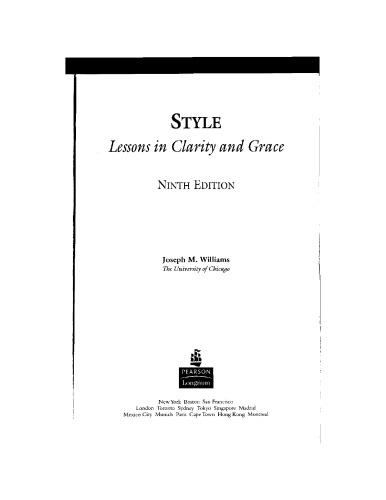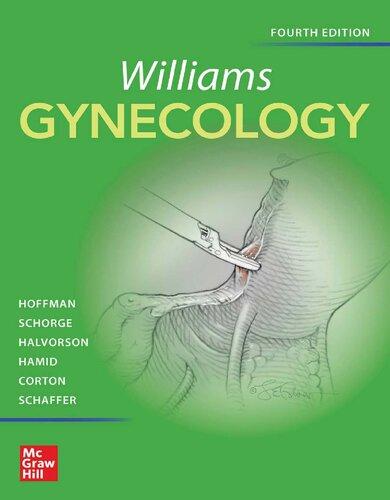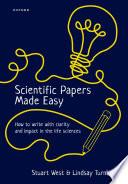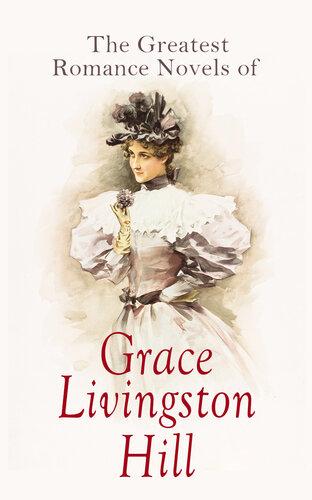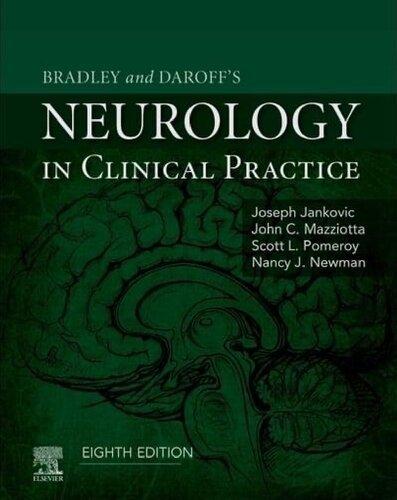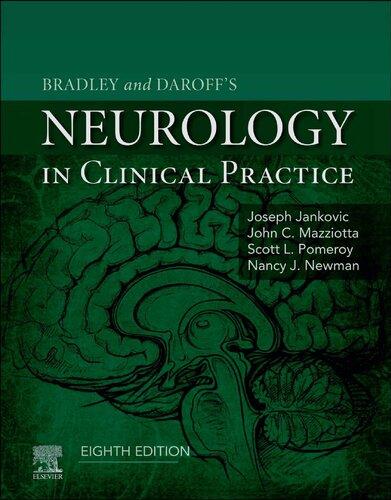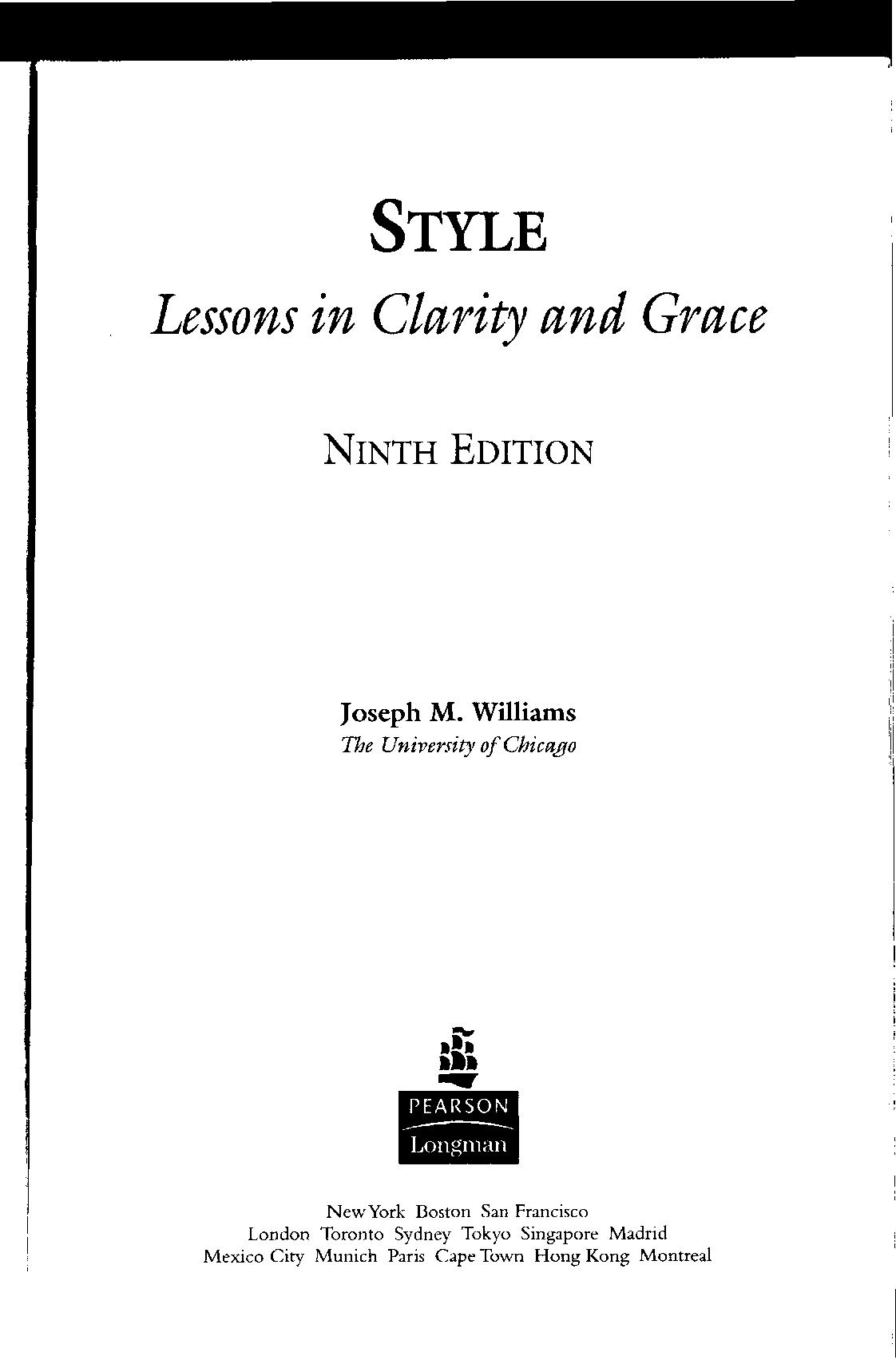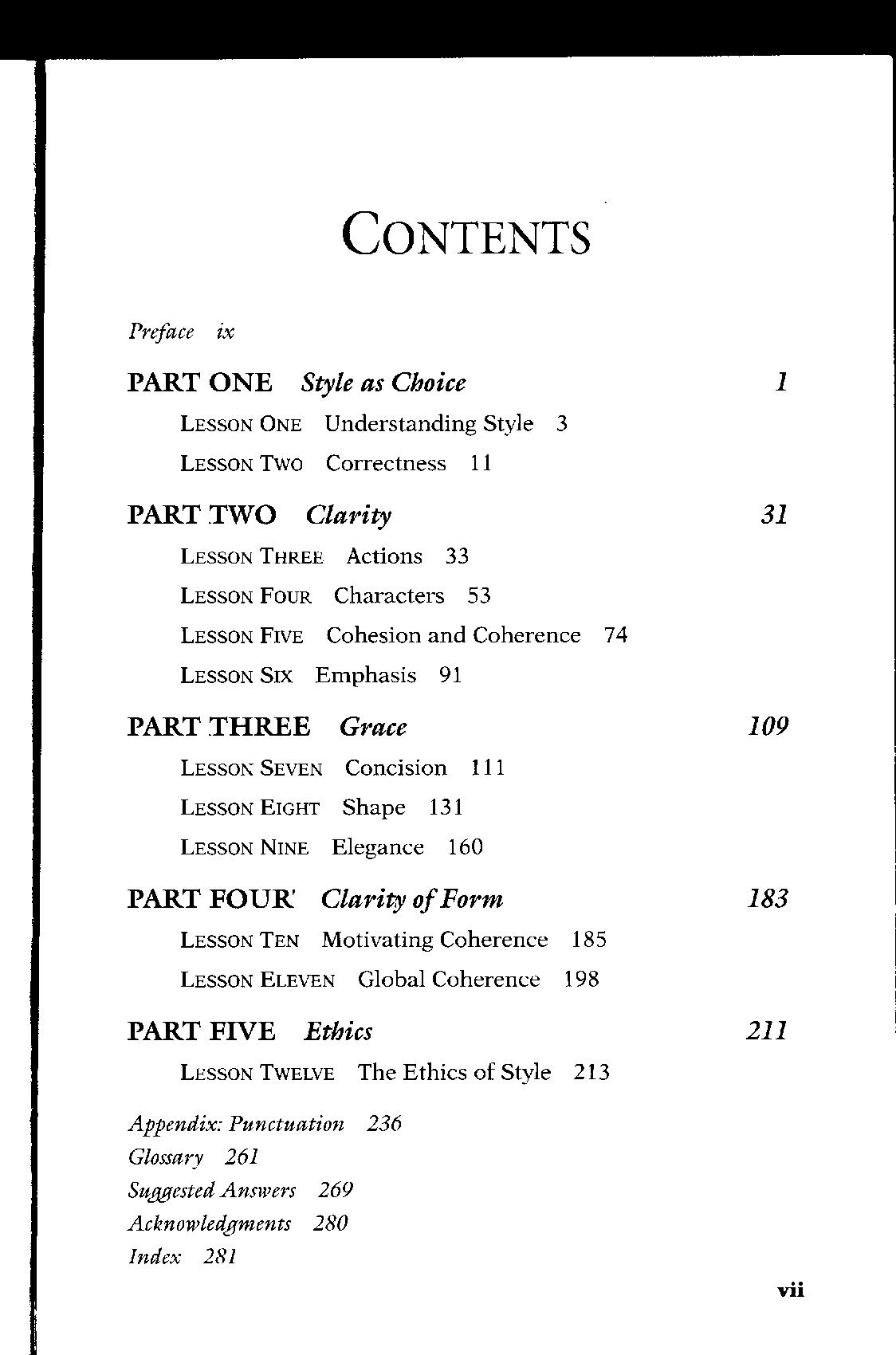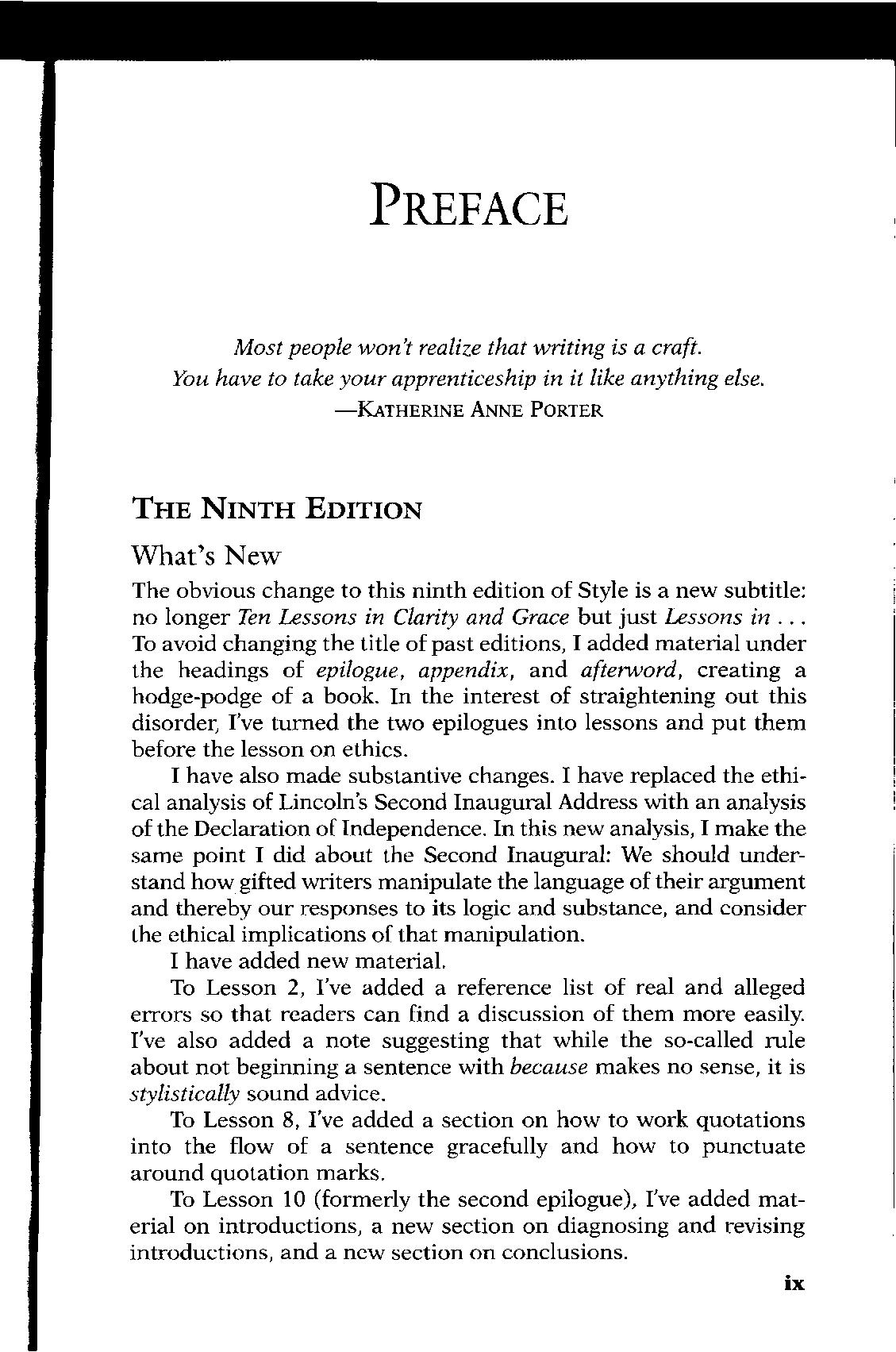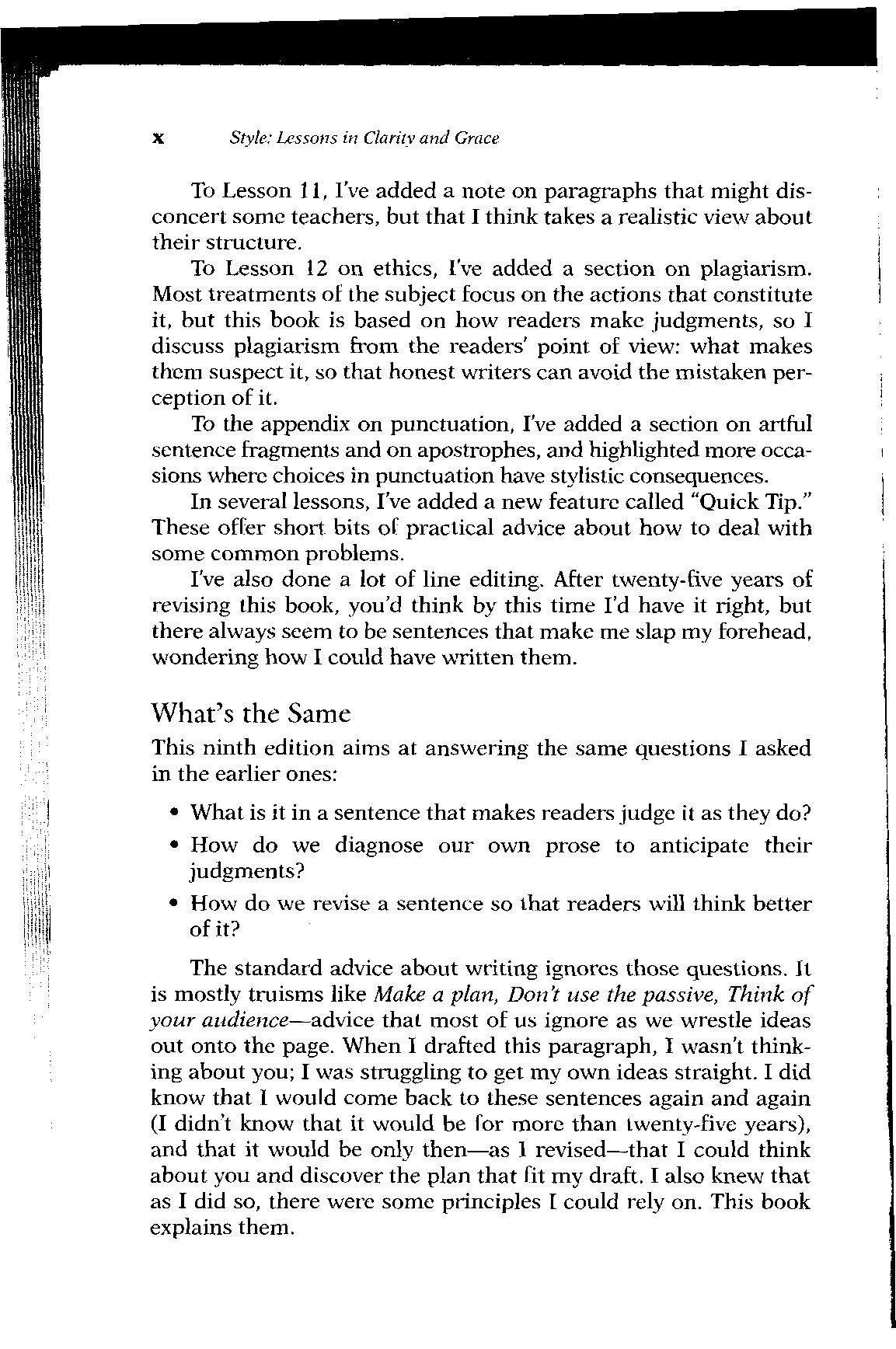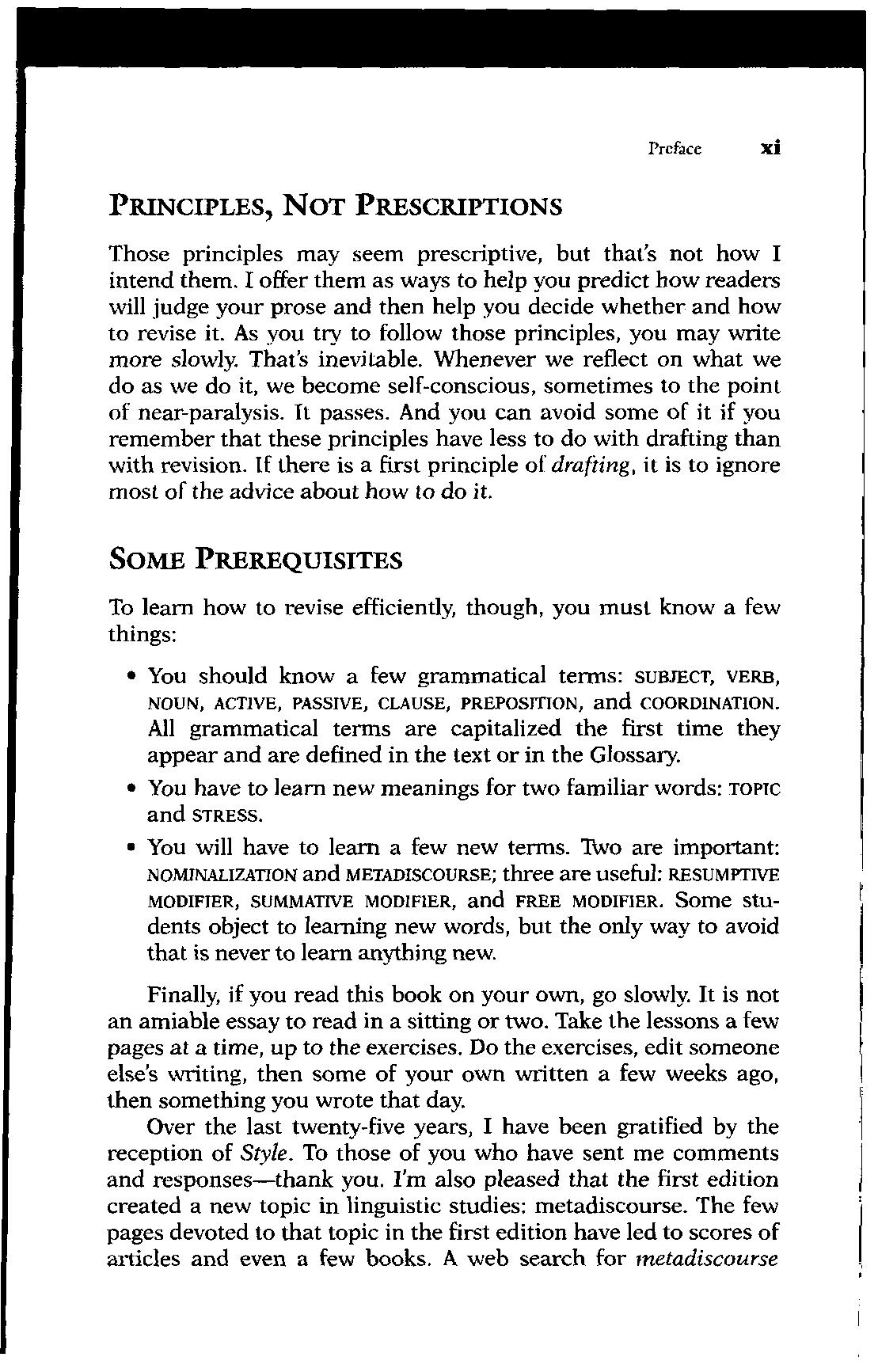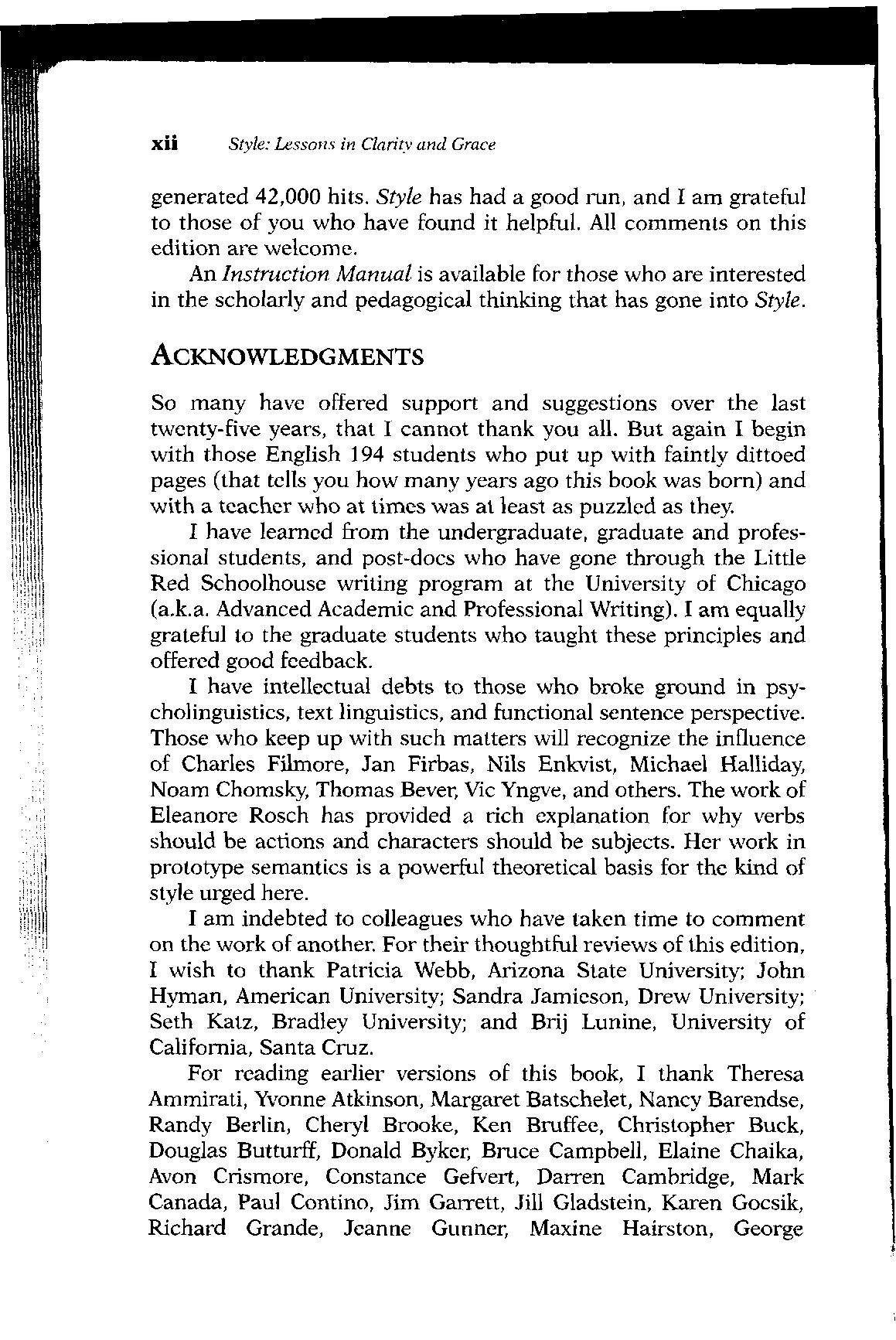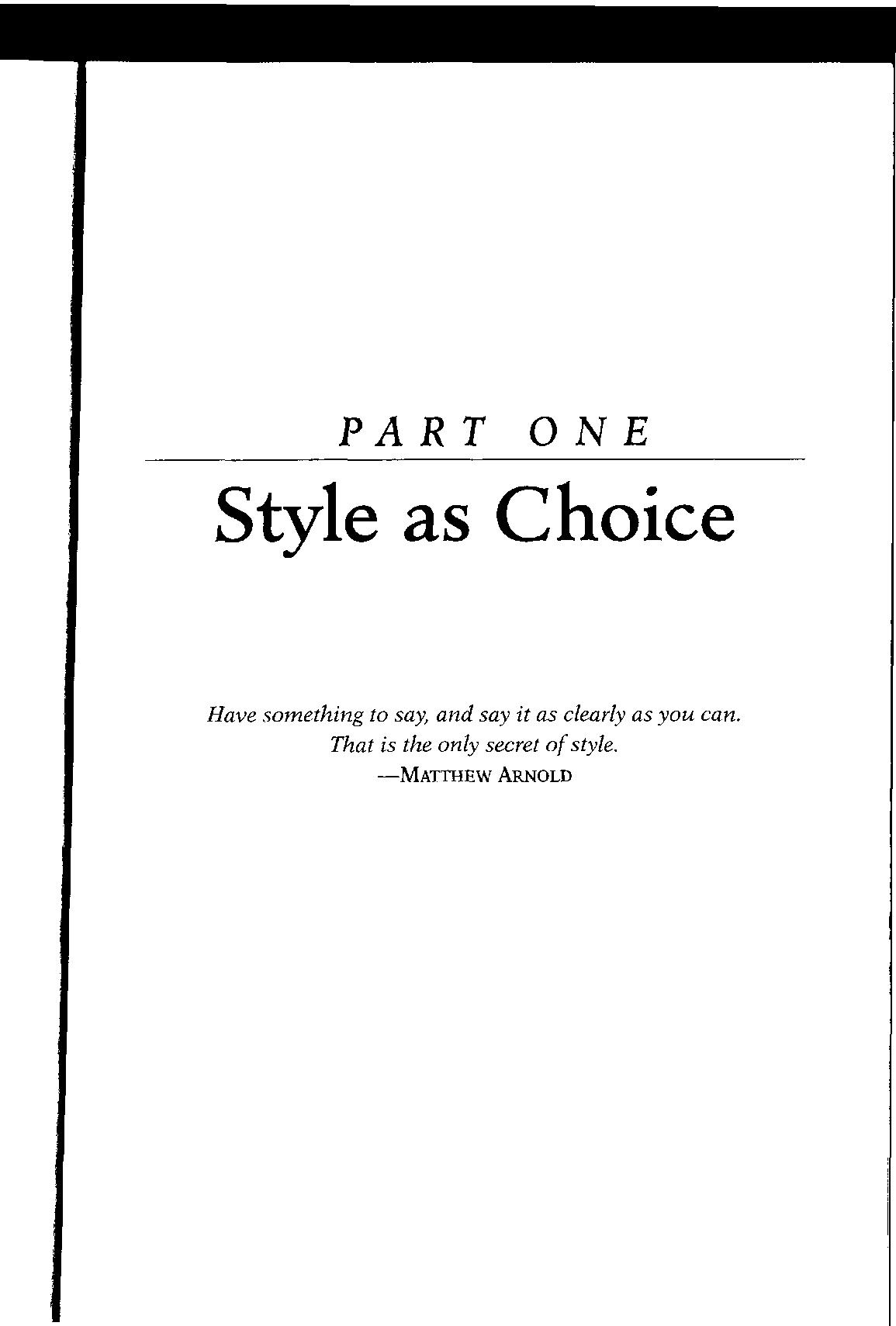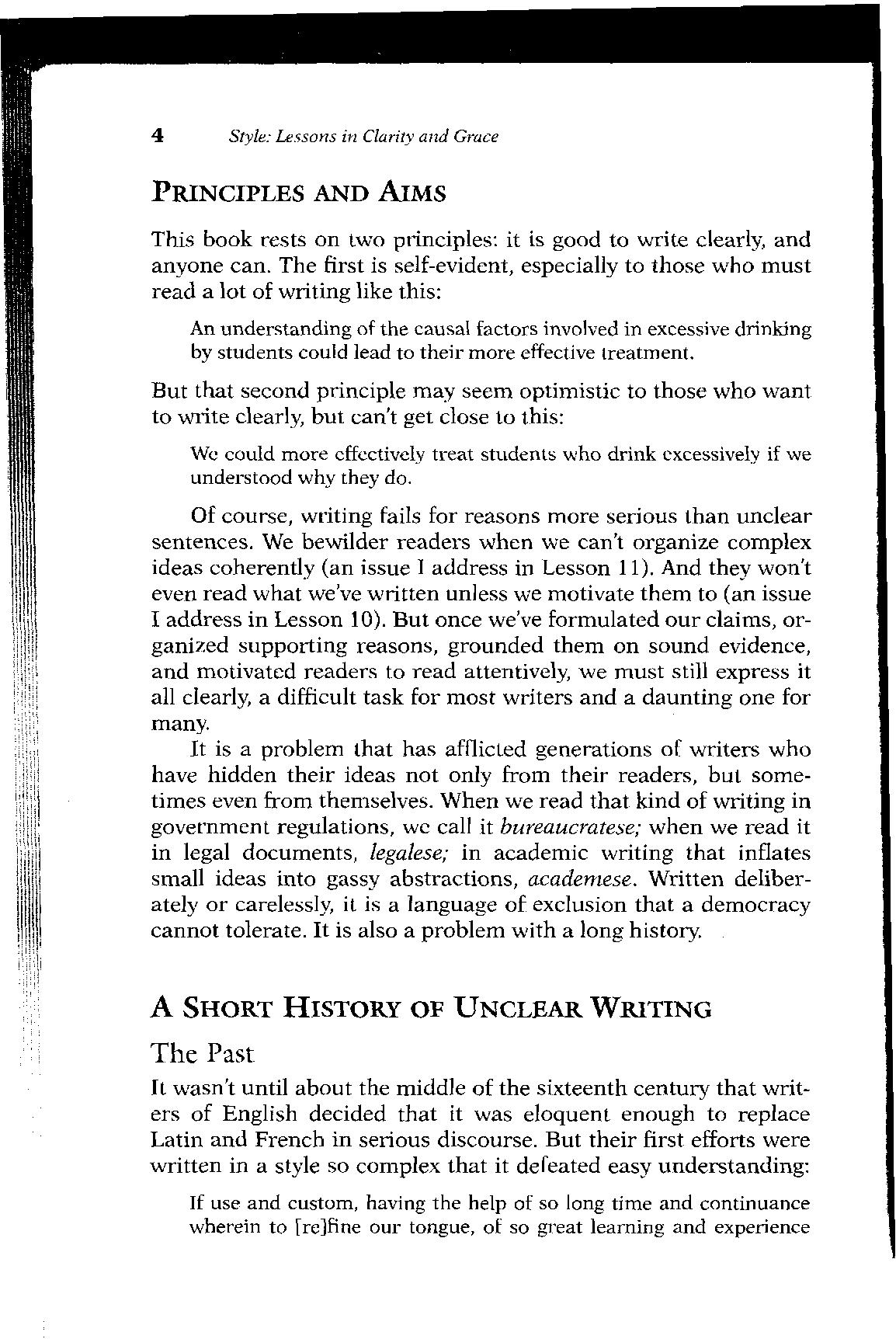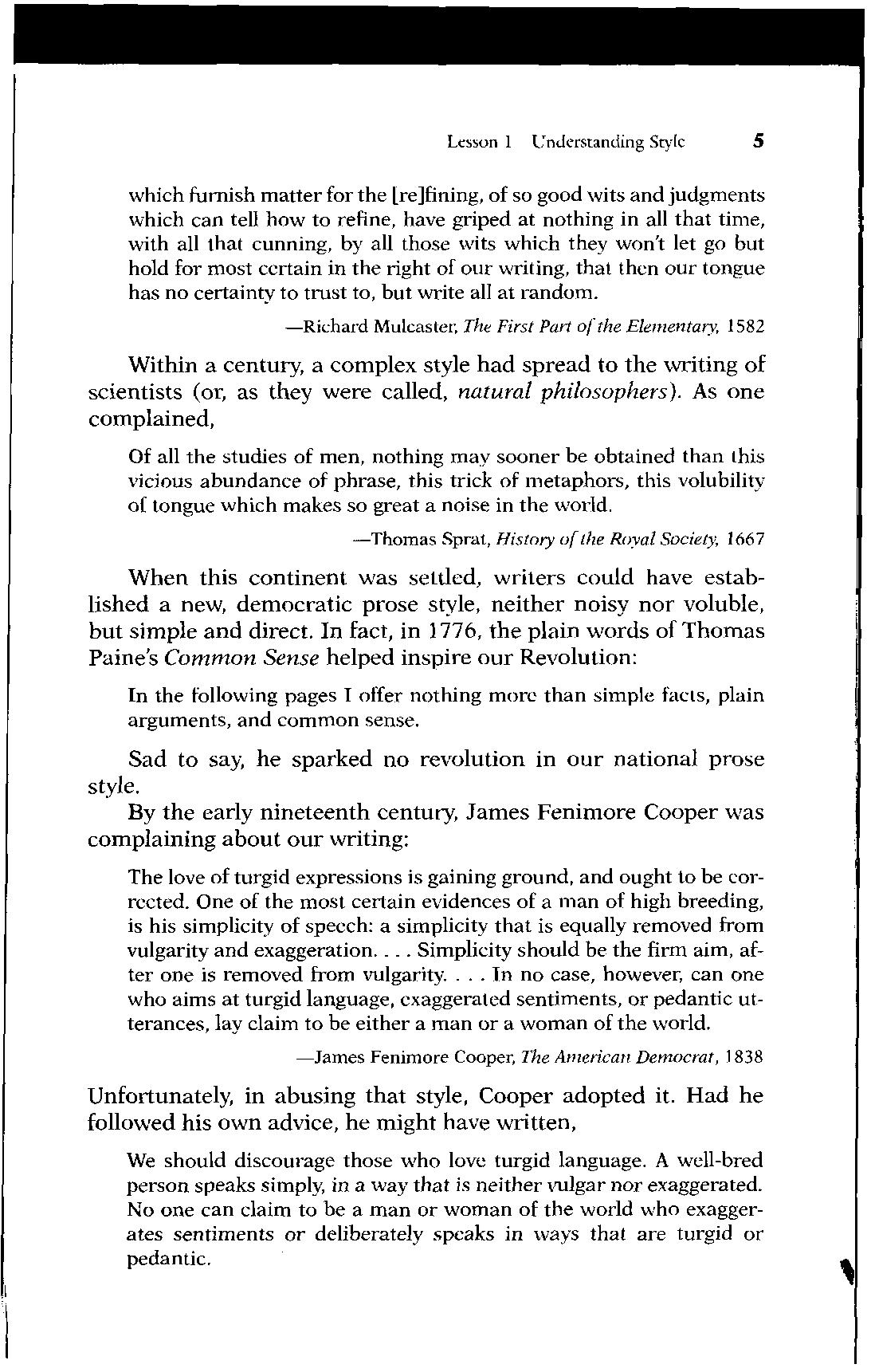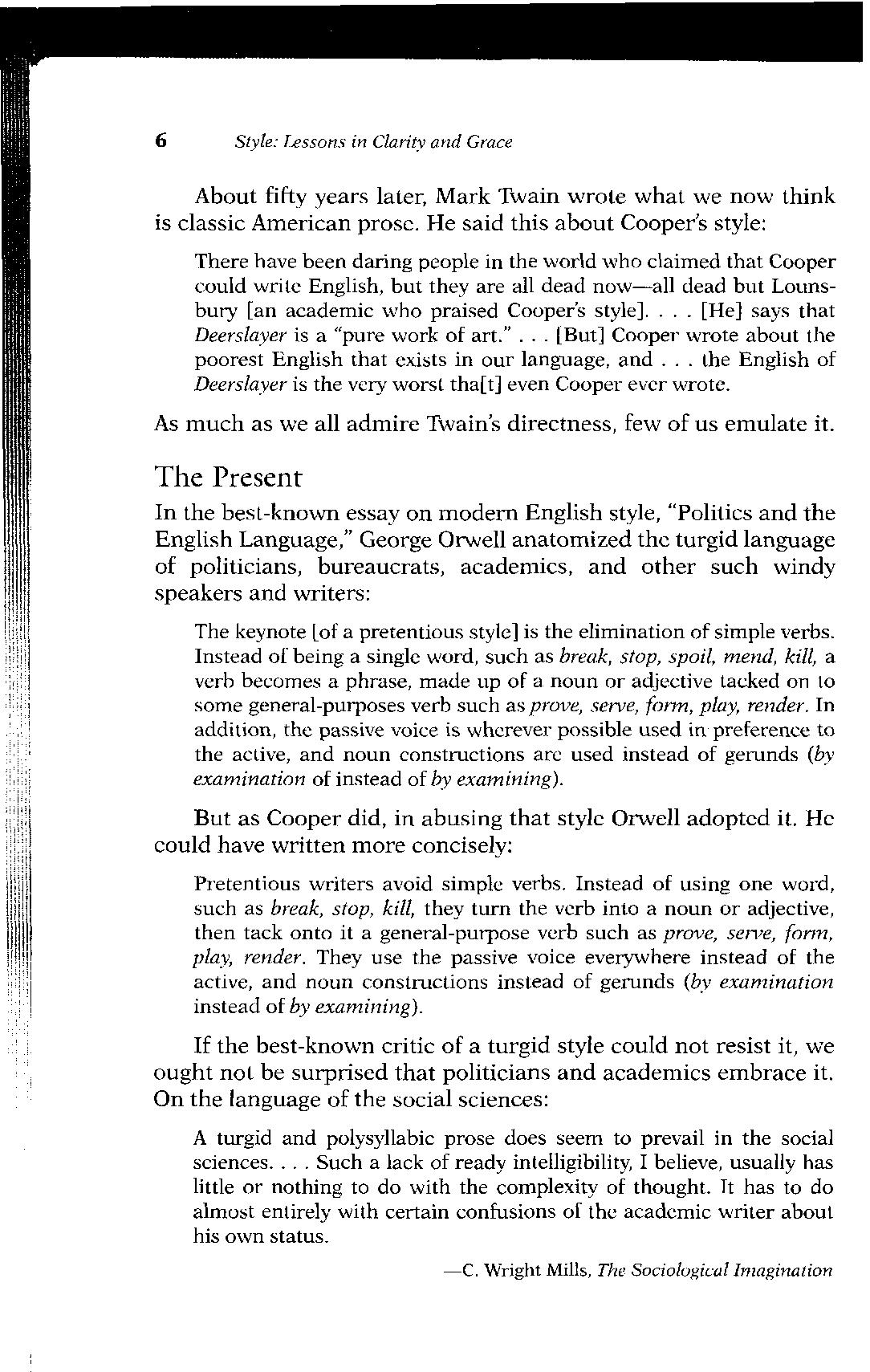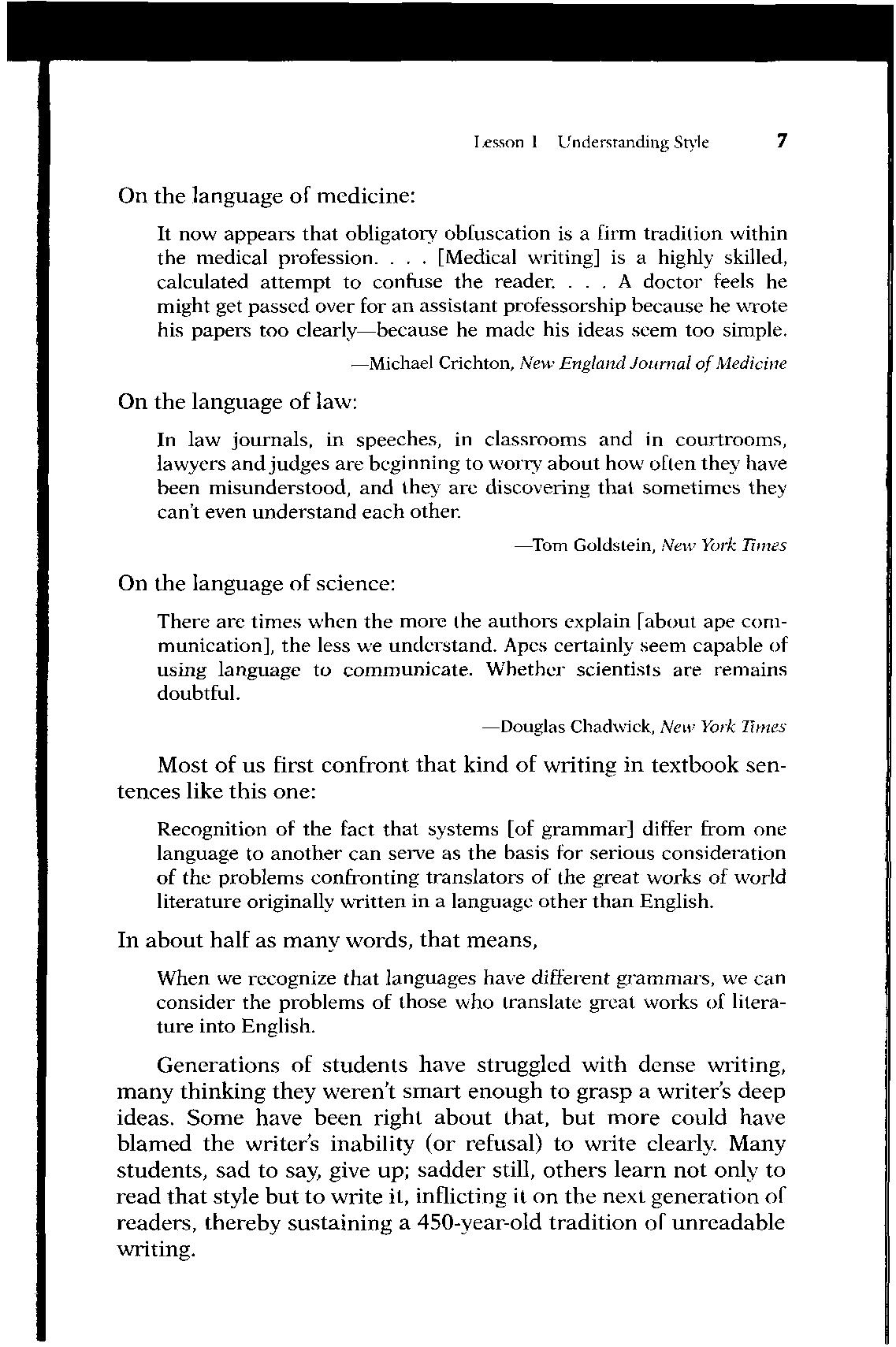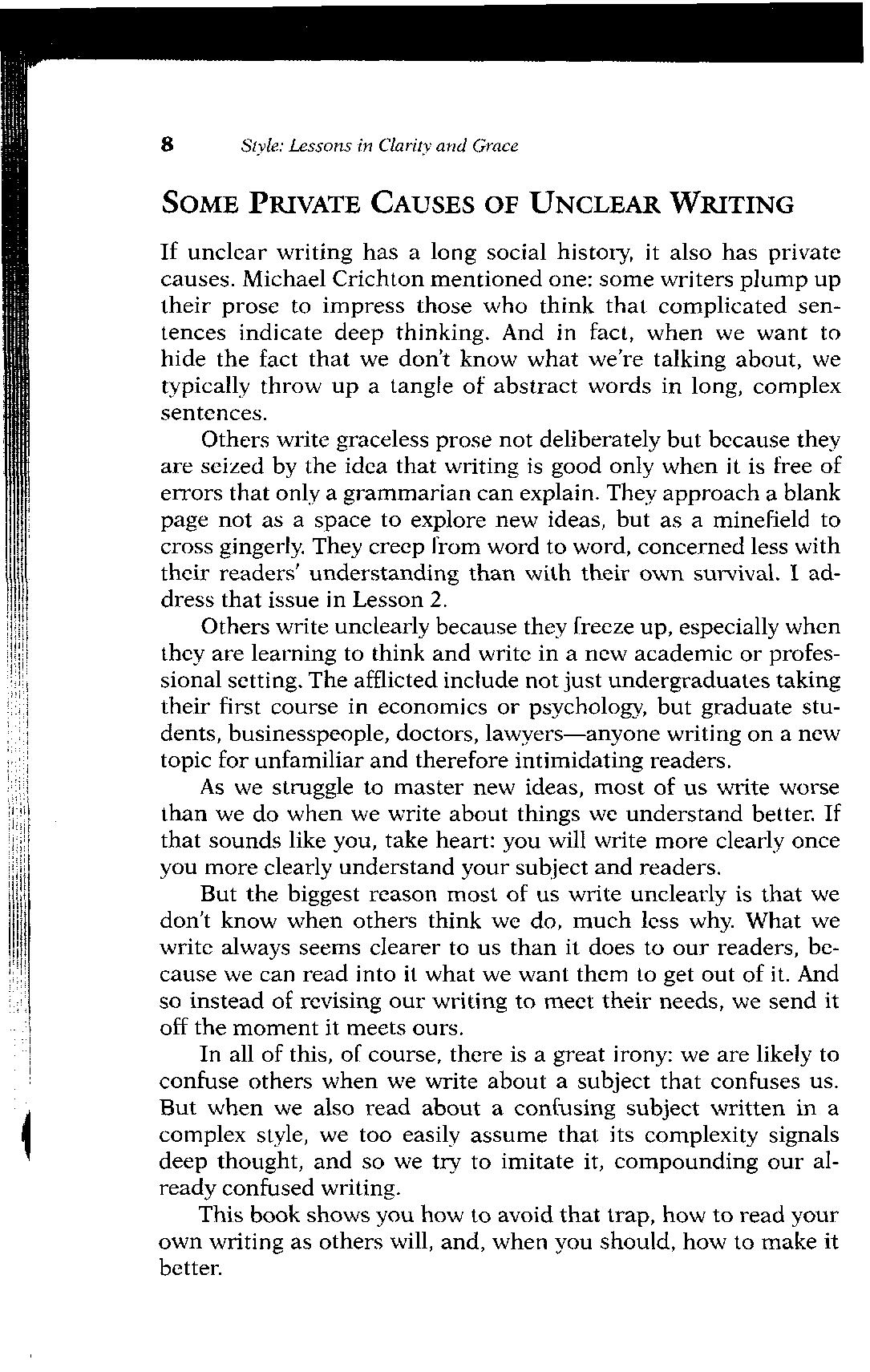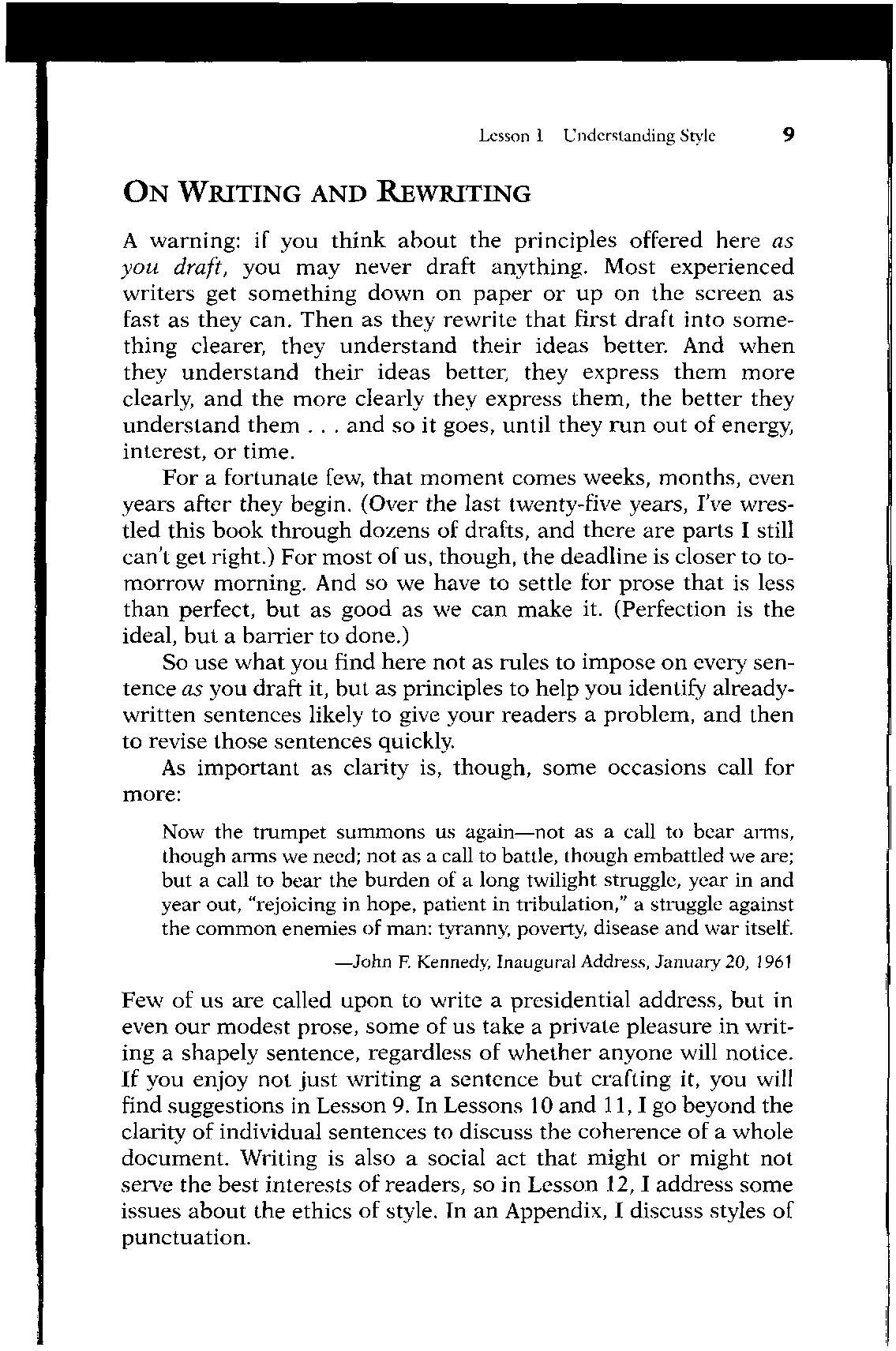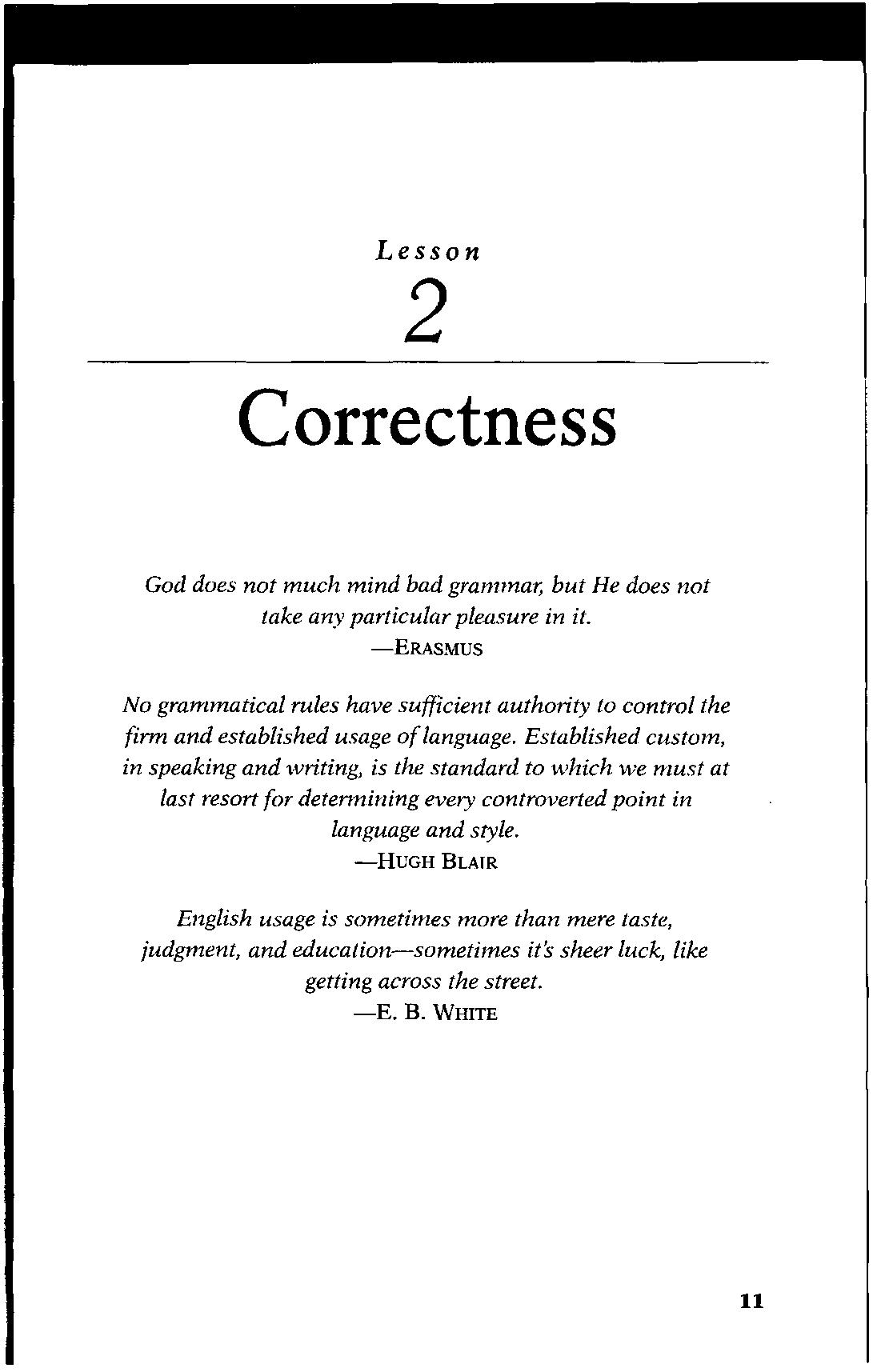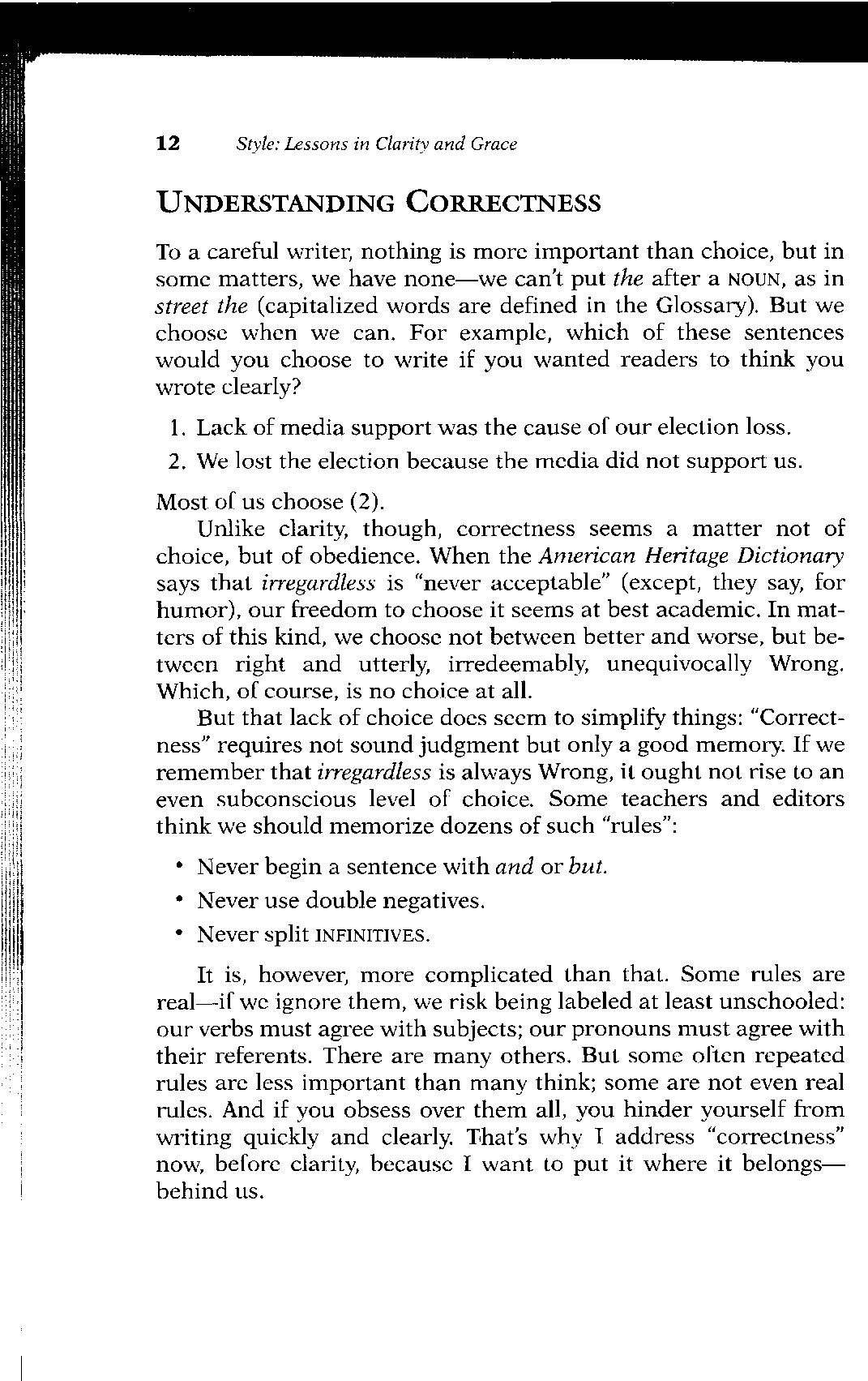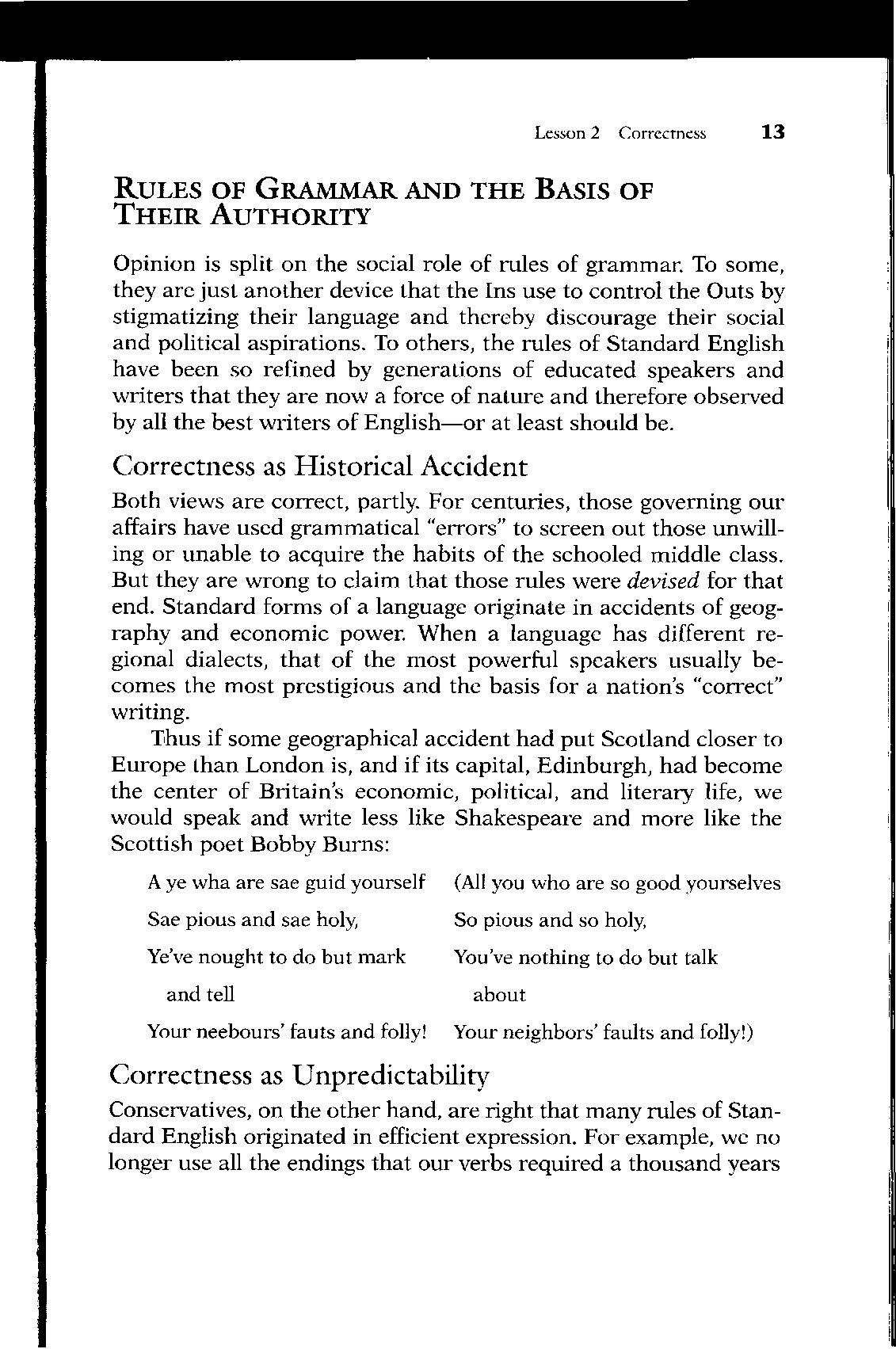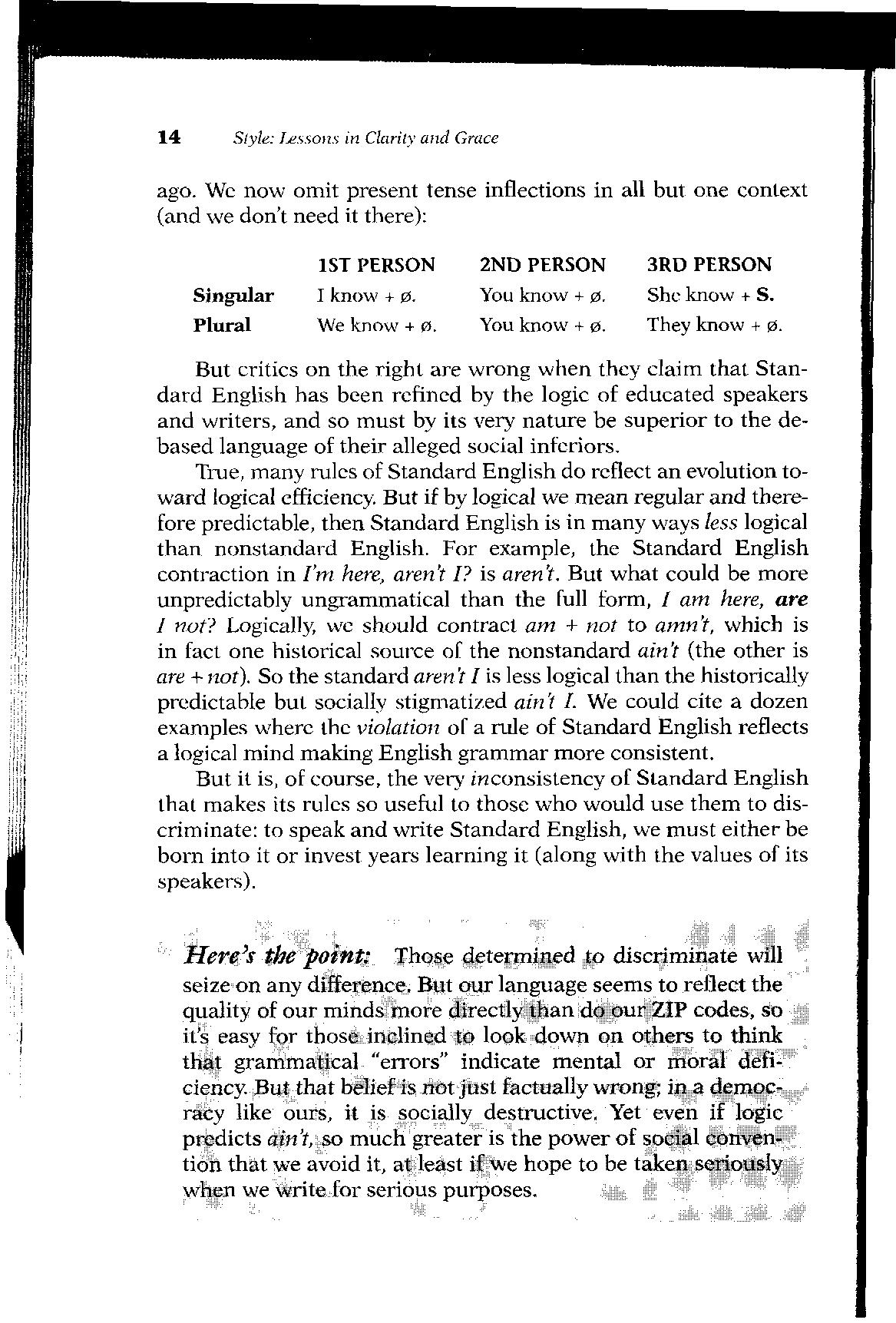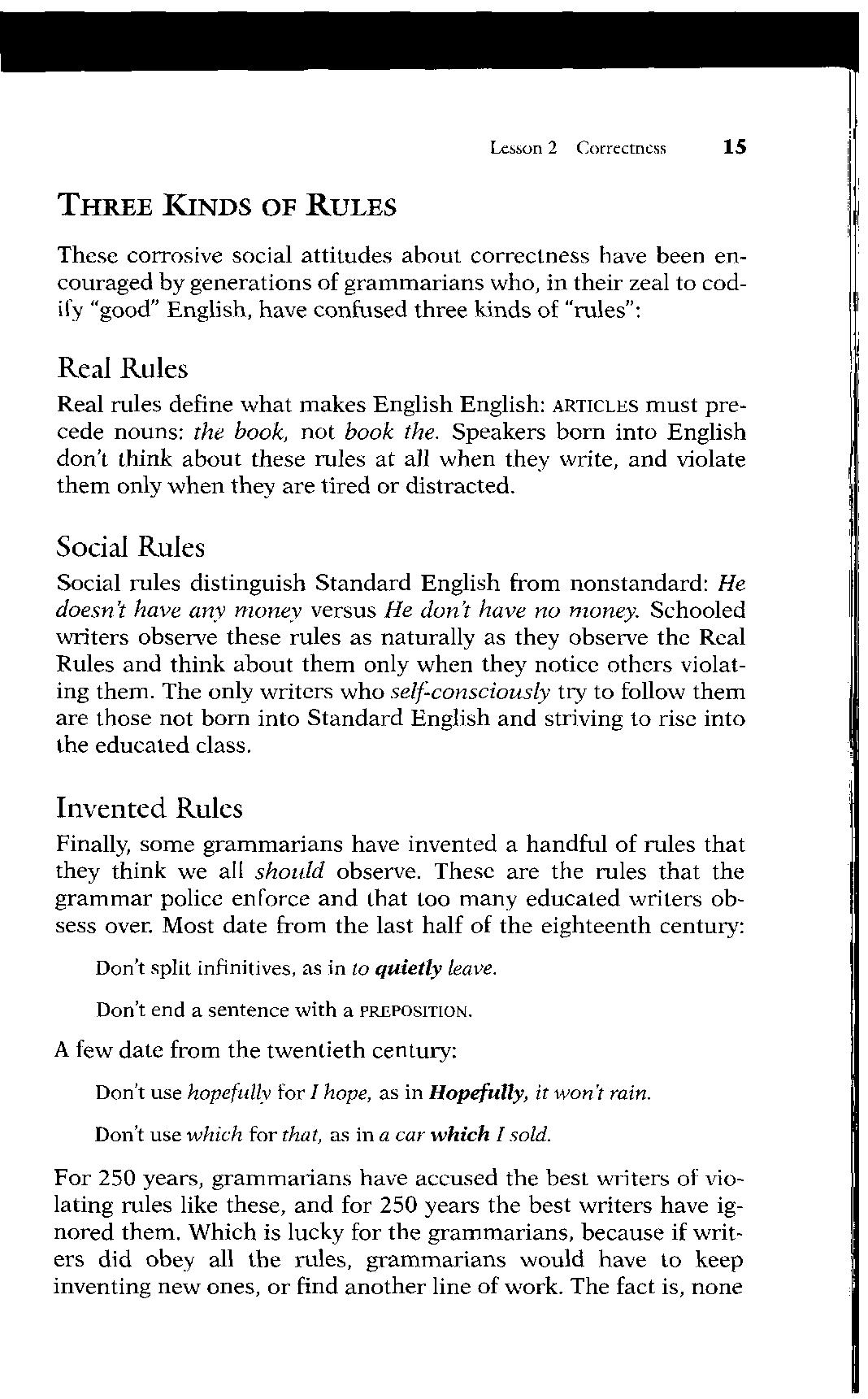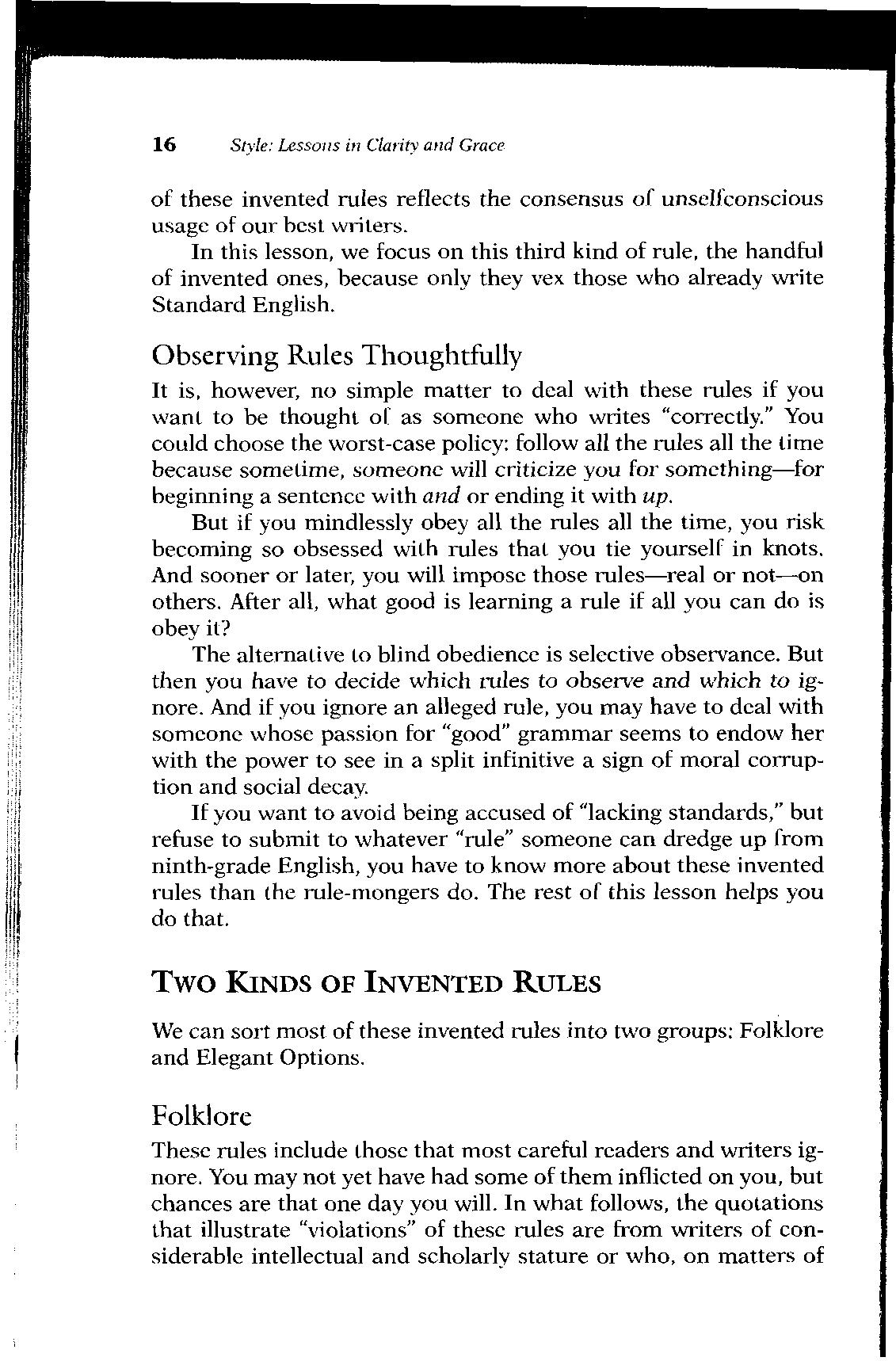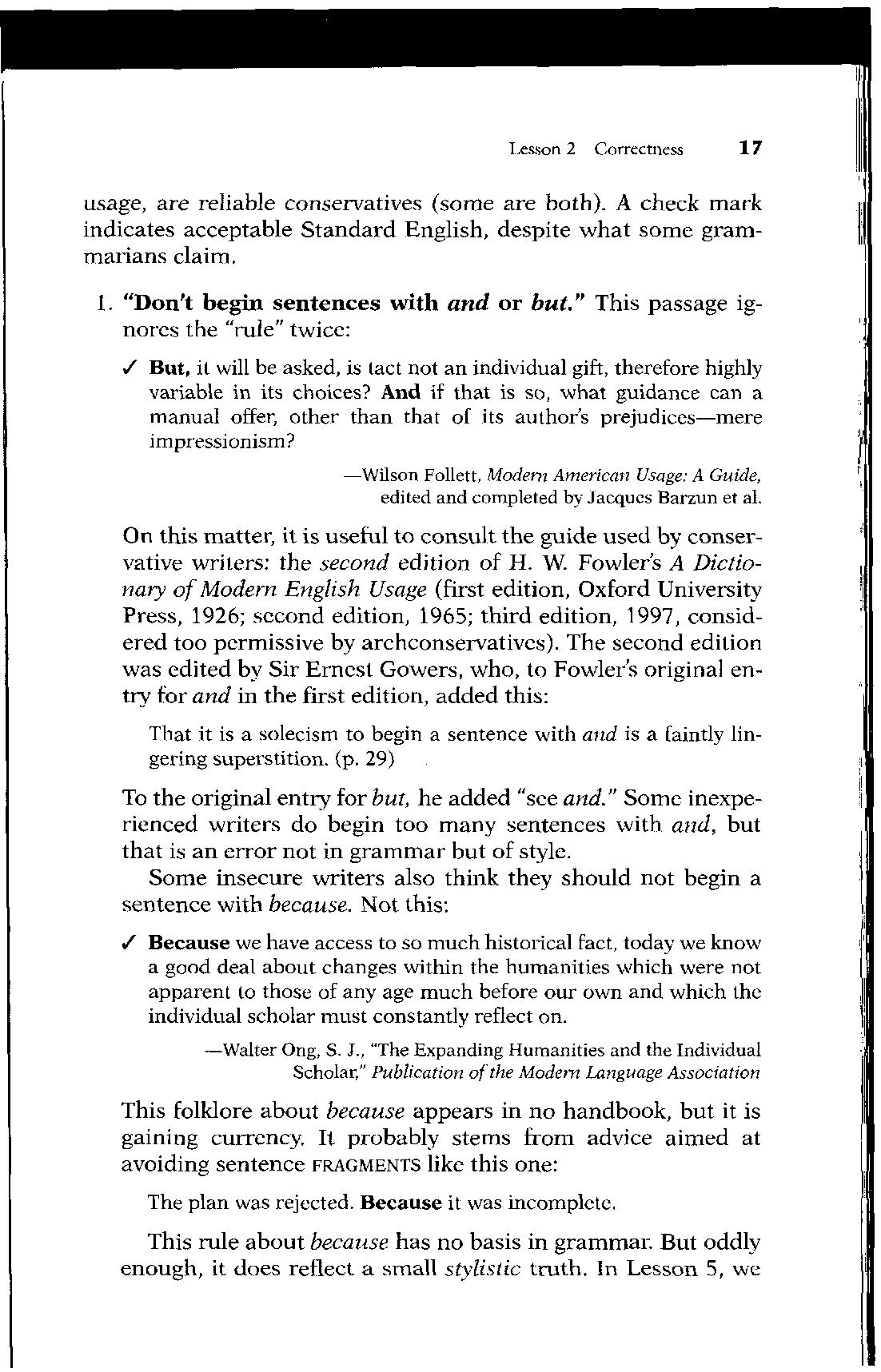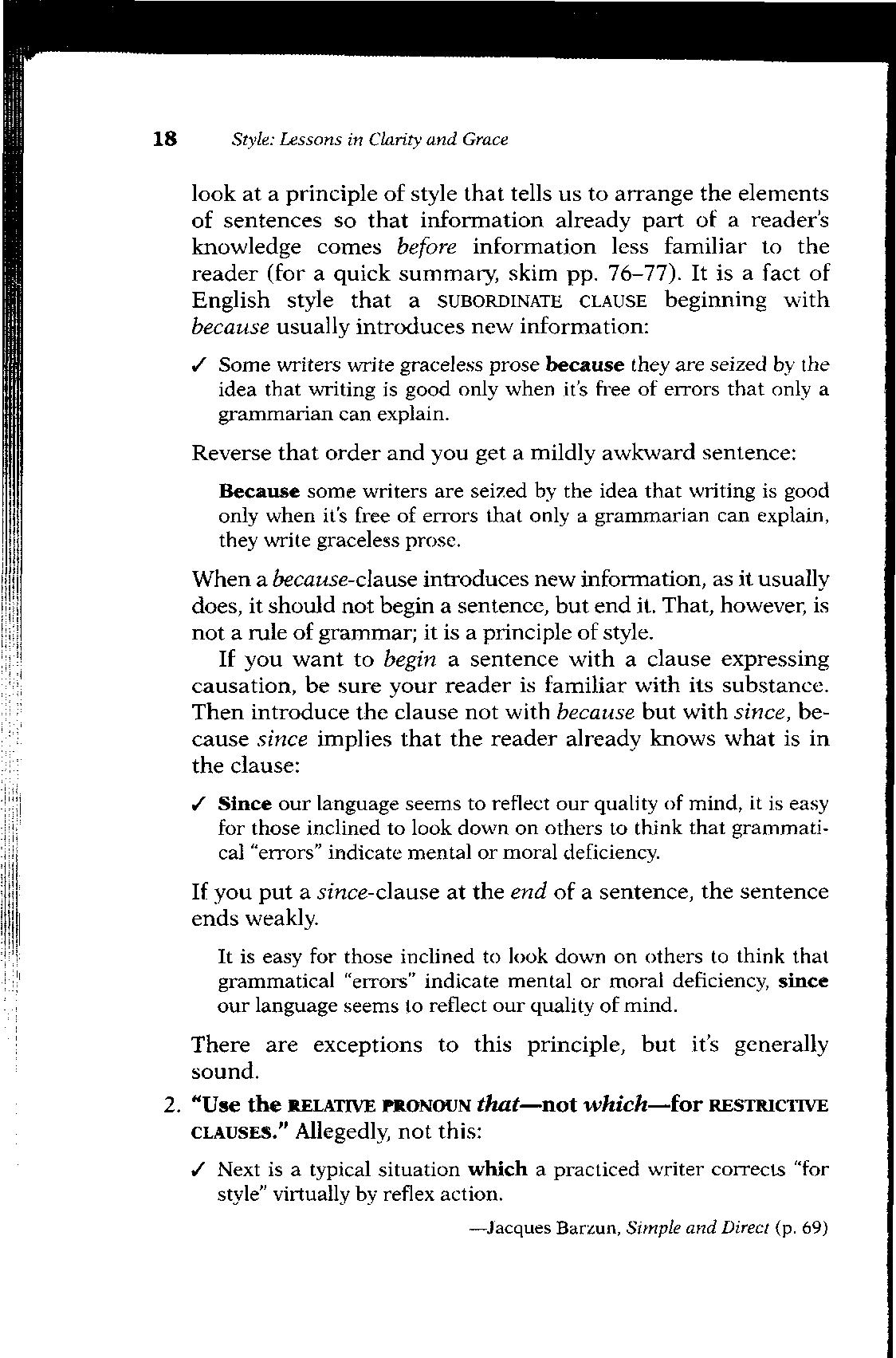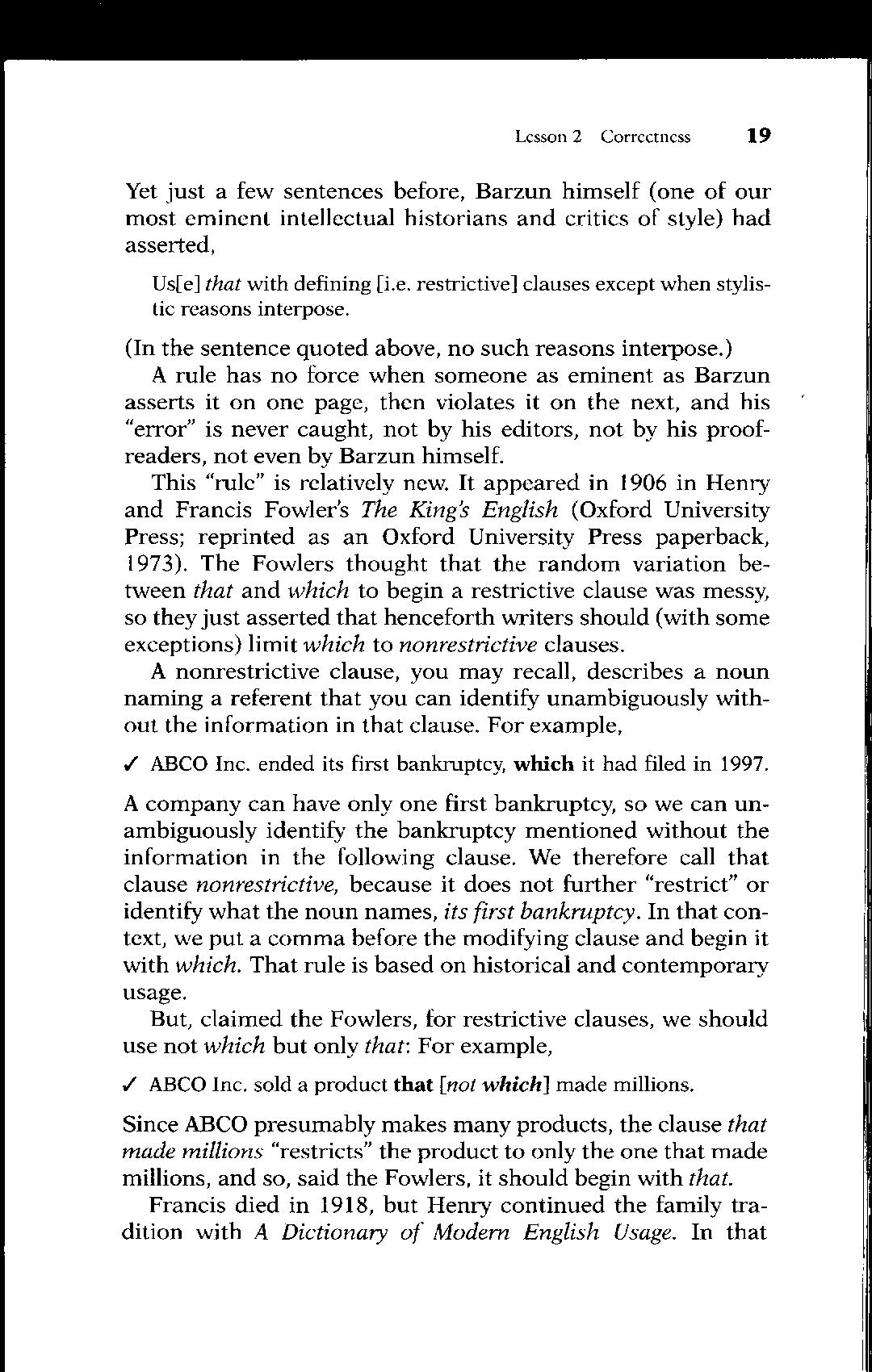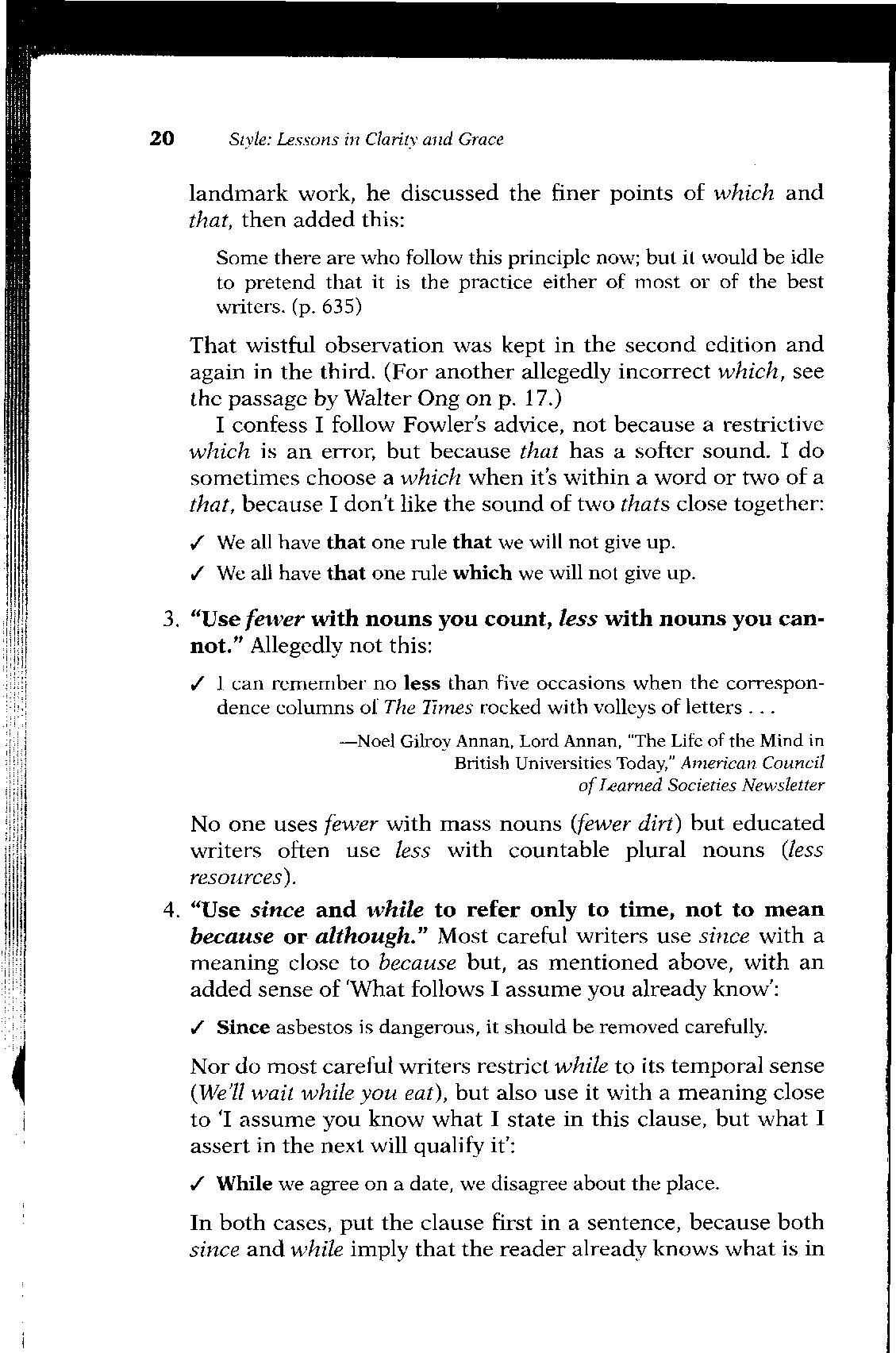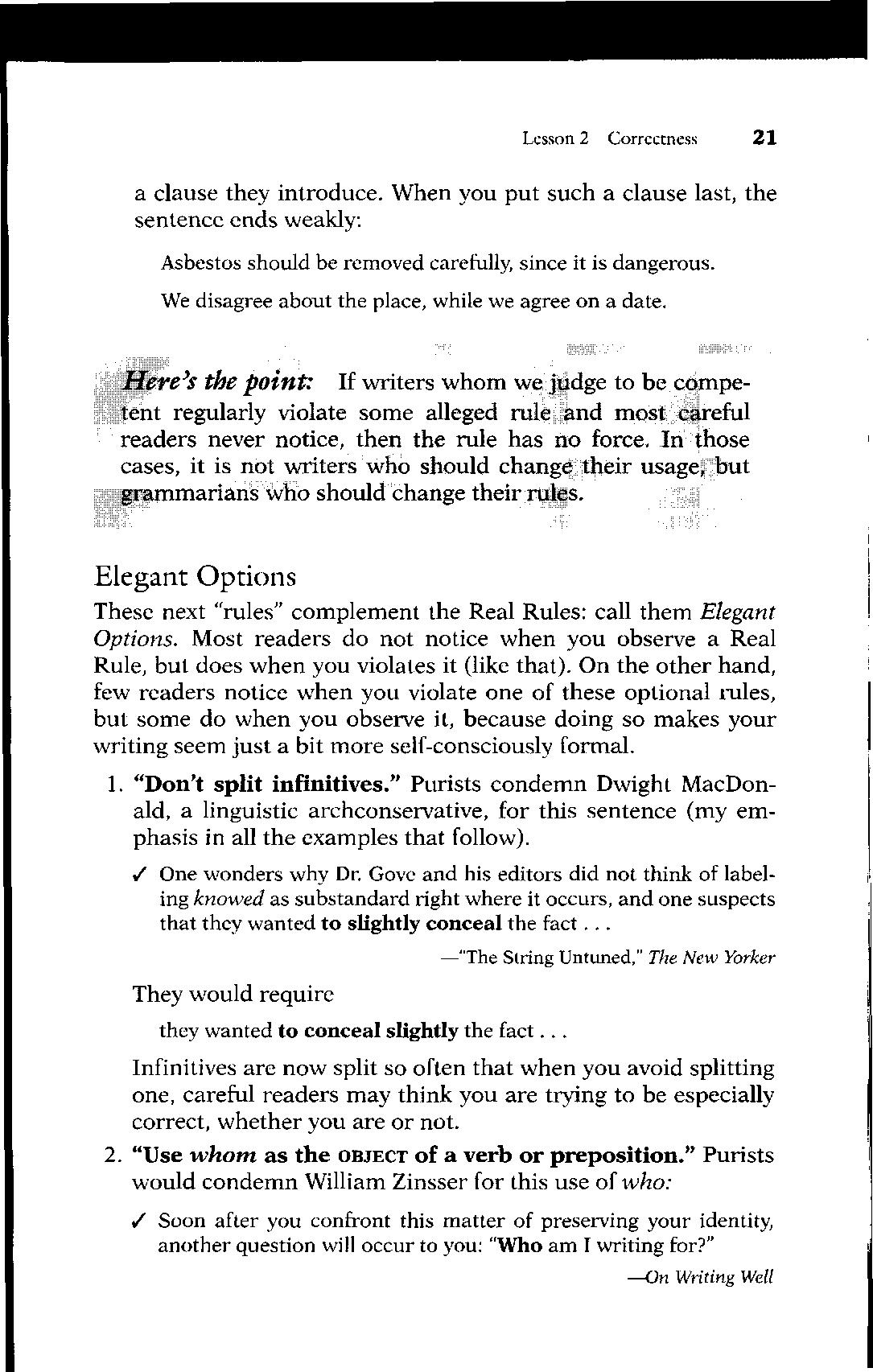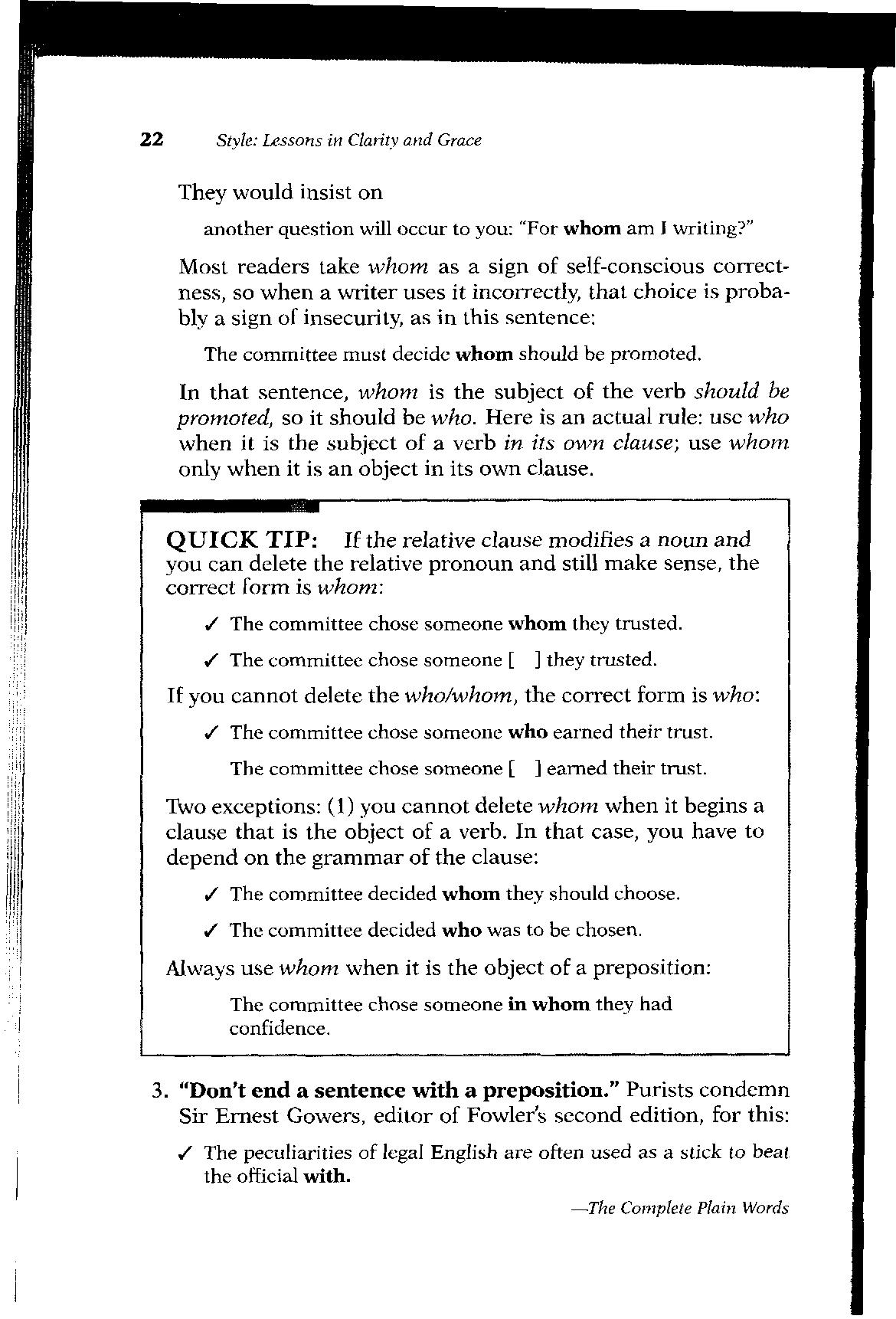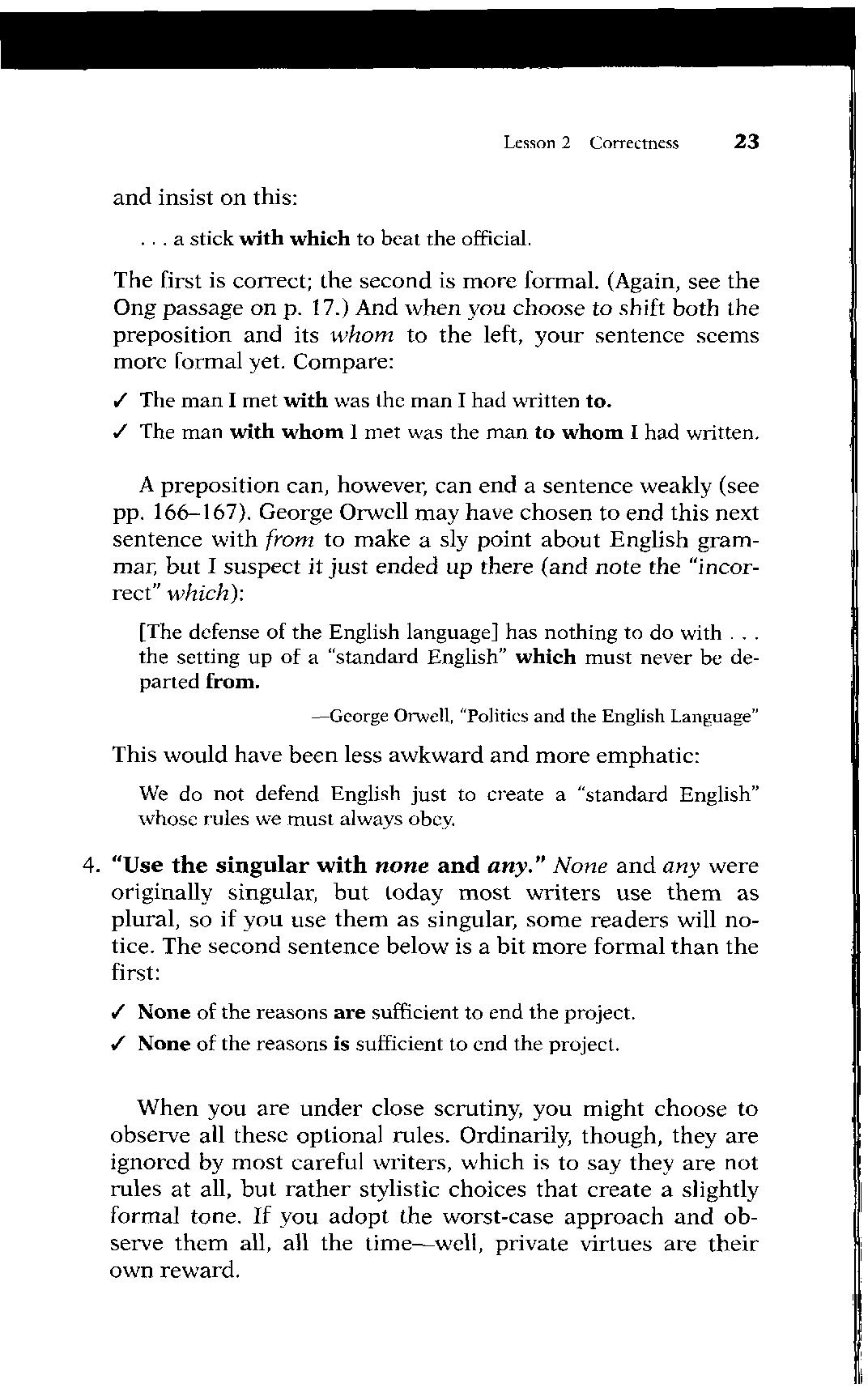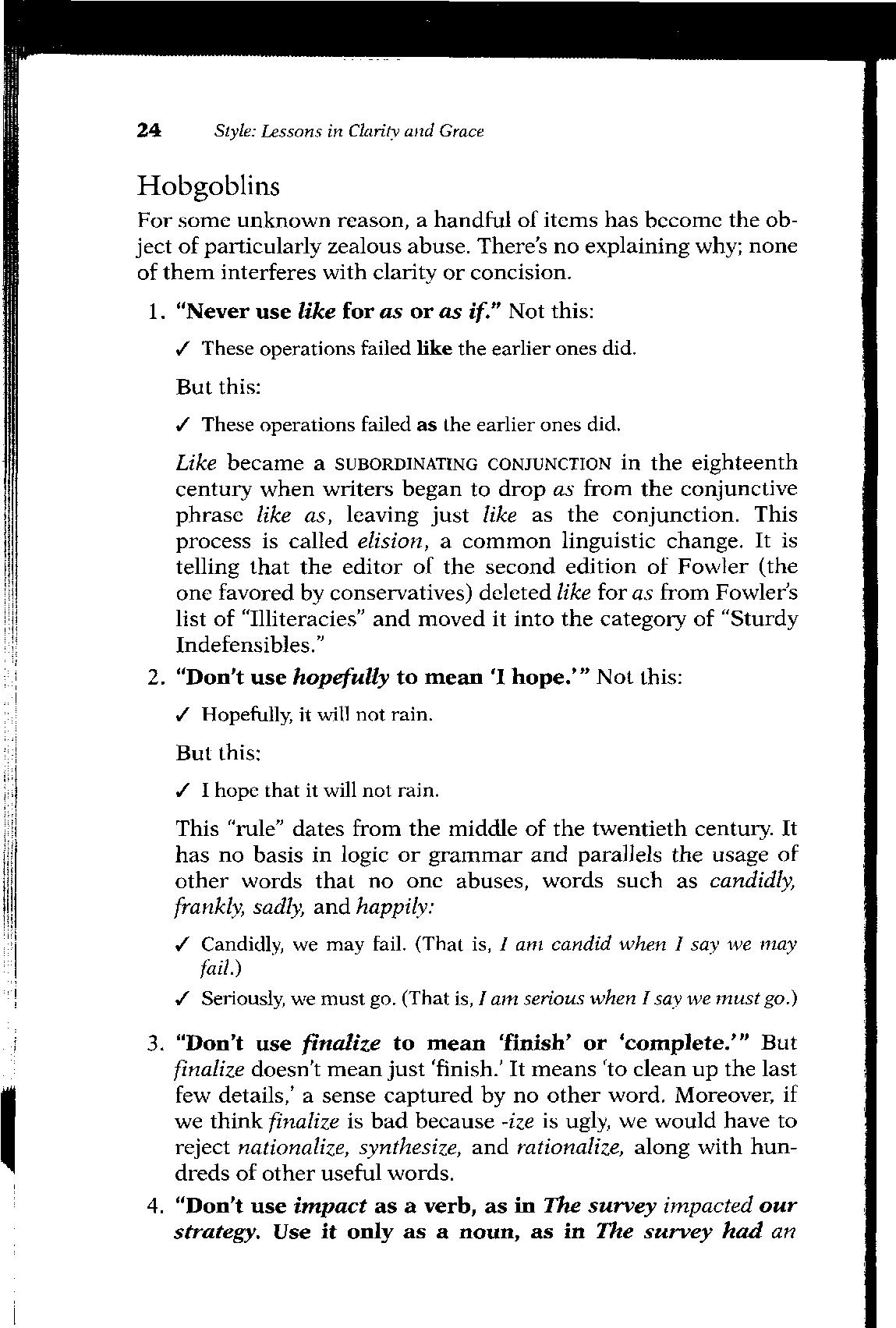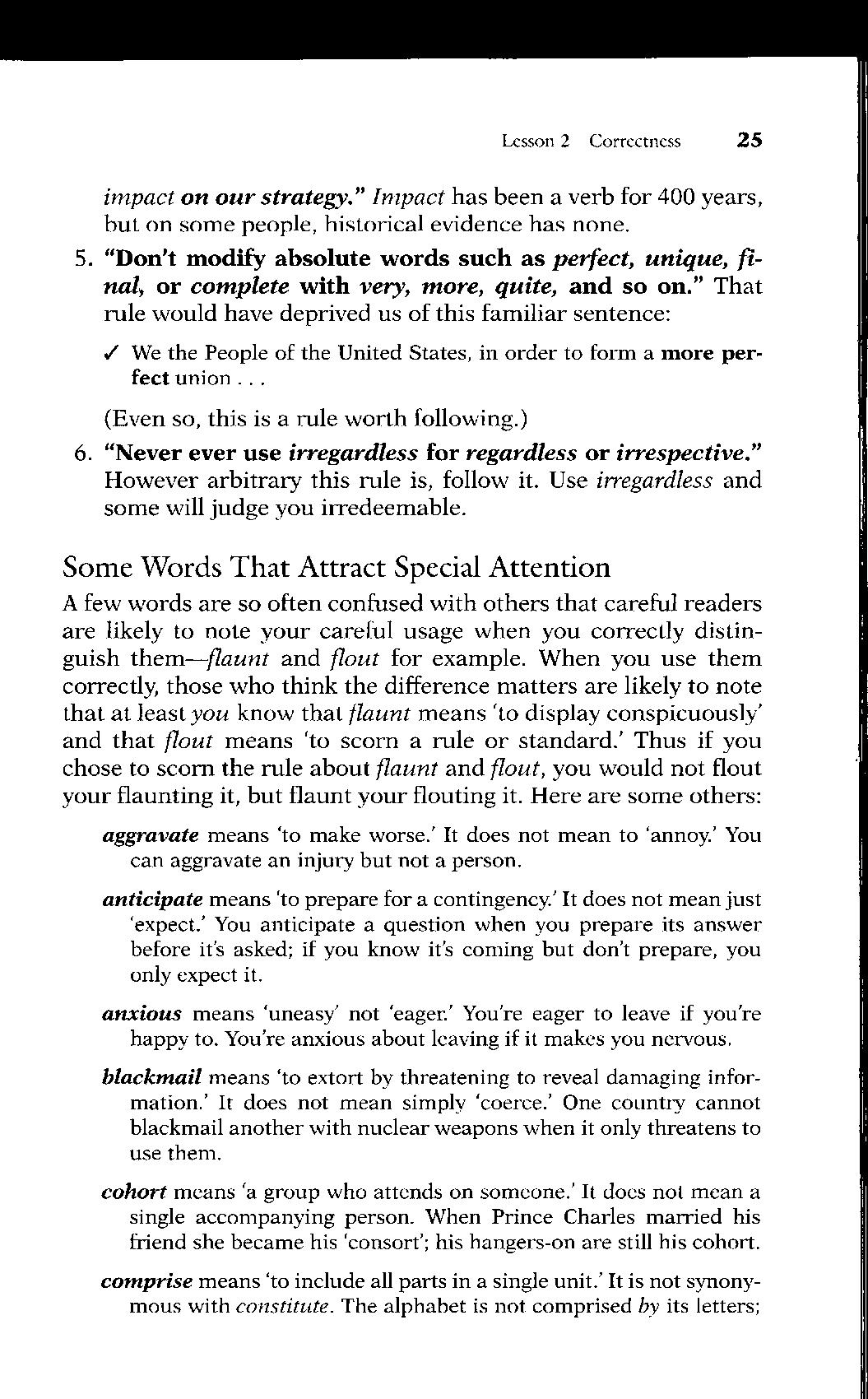PREFACE
Most people won't realize that writing is a craft. You have to take your apprenticeship in it like anything else.
—KATHERINE ANNE PORTER
THE NINTH EDITION
What's New
The obvious change to this ninth edition of Style is a new subtitle: no longer Ten Lessons in Clarity and Grace but just Lessons in ... To avoid changing the title of past editions, I added material under the headings of epilogue, appendix, and afterword, creating a hodge-podge of a book In the interest of straightening out this disorder, I've turned the two epilogues into lessons and put them before the lesson on ethics
I have also made substantive changes. I have replaced the ethical analysis of Lincoln's Second Inaugural Address with an analysis of the Declaration of Independence In this new analysis, I make the same point I did about the Second Inaugural: We should understand how giftedwriters manipulate the language of their argument and thereby our responses to its logic and substance, and consider the ethical implications of that manipulation.
I have added new material.
To Lesson 2, I've added a reference list of real and alleged errors so that readers can find a discussion of them more easily I've also added a note suggesting that while the so-called rule about not beginning a sentence with because makes no sense, it is stylistically sound advice.
To Lesson 8, I've added a section on how to work quotations into the flow of a sentence gracefully and how to punctuate around quotation marks
To Lesson 10 (formerly the second epilogue), I've added material on introductions, a new section on diagnosing and revising introductions, and a new section on conclusions.
To Lesson 11, I've added a note on paragraphs that might disconcert some teachers, but that I think takes a realistic view about their structure.
To Lesson 12 on ethics, I've added a section on plagiarism. Most treatments of the subject focus on the actions that constitute it, but this book is based on how readers make judgments, so I discuss plagiarism from the readers' point of view: what makes them suspect it, so that honest writers can avoid the mistaken perception of it
To the appendix on punctuation, I've added a section on artful sentence fragments and on apostrophes, and highlighted more occasions where choices in punctuation have stylistic consequences
In several lessons, I've added a new feature called "Quick Tip." These offer short bits of practical advice about how to deal with some common problems.
I've also done a lot of line editing. After twenty-five years of revising this book, you'd think by this time I'd have it right, but there always seem to be sentences that make me slap my forehead, wondering how I could have written them
What's the Same
This ninth edition aims at answering the same questions I asked in the earlier ones:
• What is it in a sentence that makes readers judge it as they do?
• How do we diagnose our own prose to anticipate their judgments?
• How do we revise a sentence so that readers will think better of it?
The standard advice about writing ignores those questions It is mostly truisms like Make a plan, Don't use the passive, Think of your audience—advice that most of us ignore as we wrestle ideas out onto the page. When I drafted this paragraph, I wasn't thinking about you; I was struggling to get my own ideas straight. I did know that I would come back to these sentences again and again (I didn't know that it would be for more than twenty-five years), and that it would be only then—as I revised—that I could think about you and discover the plan that fit my draft I also knew that as I did so, there were some principles I could rely on This book explains them.
PRINCIPLES, NOT PRESCRIPTIONS
Those principles may seem prescriptive, but that's not how I intend them I offer them as ways to help you predict how readers will judge your prose and then help you decide whether and how to revise it. As you try to follow those principles, you may write more slowly That's inevitable Whenever we reflect on what we do as we do it, we become self-conscious, sometimes to the point of near-paralysis It passes And you can avoid some of it if you remember that these principles have less to do with drafting than with revision. If there is a first principle of drafting, it is to ignore most of the advice about how to do it.
SOME PREREQUISITES
To learn how to revise efficiently, though, you must know a few things:
• You should know a few grammatical terms: SUBJECT, VERB, NOUN, ACTIVE, PASSIVE, CLAUSE, PREPOSITION, an d COORDINATION
All grammatical terms are capitalized the first time they appear and are defined in the text or in the Glossary.
• You have to learn new meanings for two familiar words: TOPIC an d STRESS
• You will have to learn a few new terms. Two are important: NOMINALIZATION and METADISCOURSE; three are useful: RESUMPTIVE MODIFIER, SUMMATIVE MODIFIER, and FREE MODIFIER Some students object to learning new words, but the only way to avoid that is never to learn anything new
Finally, if you read this book on your own, go slowly It is not an amiable essay to read in a sitting or two Take the lessons a few pages at a time, up to the exercises Do the exercises, edit someone else's writing, then some of your own written a few weeks ago, then something you wrote that day.
Over the last twenty-five years, I have been gratified by the reception of Style. To those of you who have sent me comments and responses—thank you. I'm also pleased that the first edition created a new topic in linguistic studies: metadiscourse The few pages devoted to that topic in the first edition have led to scores of articles and even a few books A web search for metadiscourse
generated 42,000 hits Style has had a good run, and I am grateful to those of you who have found it helpful All comments on this edition are welcome
An Instruction Manual is available for those who are interested in the scholarly and pedagogical thinking that has gone into Style.
PRINCIPLES AND AIMS
This book rests on two principles: it is good to write clearly, and anyone can The first is self-evident, especially to those who must read a lot of writing like this:
An understanding of the causal factors involved in excessive drinking by students could lead to their more effective treatment
But that second principle may seem optimistic to those who want to write clearly, but can't get close to this:
We could more effectively treat students who drink excessively if we understood why they do
Of course, writing fails for reasons more serious than unclear sentences. We bewilder readers when we can't organize complex ideas coherently (an issue I address in Lesson 11) And they won't even read what we've written unless we motivate them to (an issue I address in Lesson 10) But once we've formulated our claims, organized supporting reasons, grounded them on sound evidence, and motivated readers to read attentively, we must still express it all clearly, a difficult task for most writers and a daunting one for many
It is a problem that has afflicted generations of writers who have hidden their ideas not only from their readers, but sometimes even from themselves When we read that kind of writing in government regulations, we call it bureaucratese; when we read it in legal documents, legalese; in academic writing that inflates small ideas into gassy abstractions, academese. Written deliberately or carelessly, it is a language of exclusion that a democracy cannot tolerate It is also a problem with a long history
A SHORT HISTORY OF UNCLEAR WRITING
The Past
It wasn't until about the middle of the sixteenth century that writers of English decided that it was eloquent enough to replace Latin and French in serious discourse. But their first efforts were written in a style so complex that it defeated easy understanding: If use and custom, having the help of so long time and continuance wherein to [re]fine our tongue, of so great learning and experience
which furnish matter for the [re]fining, of so good wits and judgments which can tell how to refine, have griped at nothing in all that time, with all that cunning, by all those wits which they won't let go but hold for most certain in the right of our writing, that then our tongue has no certainty to trust to, but write all at random
—Richard Mulcaster, The First Part of the Elementary, 1582
Within a century, a complex style had spread to the writing of scientists (or, as they were called, natural philosophers). As one complained,
Of all the studies of men, nothing may sooner be obtained than this vicious abundance of phrase, this trick of metaphors, this volubility of tongue which makes so great a noise in the world.
—Thomas Sprat, History of the Royal Society, 1667
When this continent was settled, writers could have established a new, democratic prose style, neither noisy nor voluble, but simple and direct. In fact, in 1776, the plain words of Thomas Paine's Common Sense helped inspire our Revolution:
In the following pages I offer nothing more than simple facts, plain arguments, and common sense
Sad to say, he sparked no revolution in our national prose style
By the early nineteenth century, James Fenimore Cooper was complaining about our writing:
The love of turgid expressions is gaining ground, and ought to be corrected One of the most certain evidences of a man of high breeding, is his simplicity of speech: a simplicity that is equally removed from vulgarity and exaggeration. . . . Simplicity should be the firm aim, after one is removed from vulgarity. .. . In no case, however, can one who aims at turgid language, exaggerated sentiments, or pedantic utterances, lay claim to be either a man or a woman of the world.
—James Fenimore Cooper, The American Democrat, 1838
Unfortunately, in abusing that style, Cooper adopted it Had he followed his own advice, he might have written,
We should discourage those who love turgid language. A well-bred person speaks simply, in a way that is neither vulgar nor exaggerated. No one can claim to be a man or woman of the world who exaggerates sentiments or deliberately speaks in ways that are turgid or pedantic
About fifty years later, Mark Twain wrote what we now think is classic American prose. He said this about Cooper's style:
There have been daring people in the world who claimed that Cooper could write English, but they are all dead now—all dead but Lounsbuiy [an academic who praised Cooper's style], . . . [He] says that Deerslayer is a "pure work of art." [But] Cooper wrote about the poorest English that exists in our language, and the English of Deerslayer is the very worst tha[t] even Cooper ever wrote.
As much as we all admire Twain's directness, few of us emulate it.
The Present
In the best-known essay on modern English style, "Politics and the English Language," George Orwell anatomized the turgid language of politicians, bureaucrats, academics, and other such windy speakers and writers:
The keynote [of a pretentious style] is the elimination of simple verbs Instead of being a single word, such as break, stop, spoil, mend, kill, a verb becomes a phrase, made up of a noun or adjective tacked on to some general-purposes verb such as prove, serve, form, play, render. In addition, the passive voice is wherever possible used in preference to the active, and noun constructions are used instead of gerunds (by examination of instead of by examining).
But as Cooper did, in abusing that style Orwell adopted it He could have written more concisely:
Pretentious writers avoid simple verbs Instead of using one word, such as break, stop, kill, they turn the verb into a noun or adjective, then tack onto it a general-purpose verb such as prove, serve, form, play, render. They use the passive voice everywhere instead of the active, and noun constructions instead of gerunds (by examination instead of by examining).
If the best-known critic of a turgid style could not resist it, we ought not be surprised that politicians and academics embrace it On the language of the social sciences:
A turgid and polysyllabic prose does seem to prevail in the social sciences Such a lack of ready intelligibility, I believe, usually has little or nothing to do with the complexity of thought It has to do almost entirely with certain confusions of the academic writer about his own status
—C. Wright Mills, The Sociological Imagination
On the language of medicine:
It now appears that obligatory obfuscation is a firm tradition within the medical profession [Medical writing] is a highly skilled, calculated attempt to confuse the reader. .. . A doctor feels he might get passed over for an assistant professorship because he wrote his papers too clearly—because he made his ideas seem too simple
—Michael Crichton, New England Journal of Medicine
On the language of law:
In law journals, in speeches, in classrooms and in courtrooms, lawyers and judges are beginning to worry about how often they have been misunderstood, and they are discovering that sometimes they can't even understand each other
—Tom Goldstein, New York Times
On the language of science:
There are times when the more the authors explain [about ape communication], the less we understand. Apes certainly seem capable of using language to communicate. Whether scientists are remains doubtful.
—Douglas Chadwick, New York Times
Most of us first confront that kind of writing in textbook sentences like this one:
Recognition of the fact that systems [of grammar] differ from one language to another can serve as the basis for serious consideration of the problems confronting translators of the great works of world literature originally written in a language other than English.
In about half as many words, that means,
When we recognize that languages have different grammars, we can consider the problems of those who translate great works of literature into English.
Generations of students have struggled with dense writing, many thinking they weren't smart enough to grasp a writer's deep ideas. Some have been right about that, but more could have blamed the writer's inability (or refusal) to write clearly Many students, sad to say, give up; sadder still, others learn not only to read that style but to write it, inflicting it on the next generation of readers, thereby sustaining a 450-year-old tradition of unreadable writing
SOME PRIVATE CAUSES OF UNCLEAR WRITING
If unclear writing has a long social history, it also has private causes Michael Crichton mentioned one: some writers plump up their prose to impress those who think that complicated sentences indicate deep thinking And in fact, when we want to hide the fact that we don't know what we're talking about, we typically throw up a tangle of abstract words in long, complex sentences.
Others write graceless prose not deliberately but because they are seized by the idea that writing is good only when it is free of errors that only a grammarian can explain. They approach a blank page not as a space to explore new ideas, but as a minefield to cross gingerly. They creep from word to word, concerned less with their readers' understanding than with their own survival I address that issue in Lesson 2
Others write unclearly because they freeze up, especially when they are learning to think and write in a new academic or professional setting. The afflicted include not just undergraduates taking their first course in economics or psychology, but graduate students, businesspeople, doctors, lawyers—anyone writing on a new topic for unfamiliar and therefore intimidating readers
As we struggle to master new ideas, most of us write worse than we do when we write about things we understand better If that sounds like you, take heart: you will write more clearly once you more clearly understand your subject and readers.
But the biggest reason most of us write unclearly is that we don't know when others think we do, much less why What we write always seems clearer to us than it does to our readers, because we can read into it what we want them to get out of it And so instead of revising our writing to meet their needs, we send it off the moment it meets ours.
In all of this, of course, there is a great irony: we are likely to confuse others when we write about a subject that confuses us But when we also read about a confusing subject written in a complex style, we too easily assume that its complexity signals deep thought, and so we try to imitate it, compounding our already confused writing.
This book shows you how to avoid that trap, how to read your own writing as others will, and, when you should, how to make it better
O N WRITING AND REWRITING
A warning: if you think about the principles offered here as you draft, you may never draft anything. Most experienced writers get something down on paper or up on the screen as fast as they can Then as they rewrite that first draft into something clearer, they understand their ideas better And when they understand their ideas better, they express them more clearly, and the more clearly they express them, the better they understand them . . . and so it goes, until they run out of energy, interest, or time.
For a fortunate few, that moment comes weeks, months, even years after they begin (Over the last twenty-five years, I've wrestled this book through dozens of drafts, and there are parts I still can't get right.) For most of us, though, the deadline is closer to tomorrow morning. And so we have to settle for prose that is less than perfect, but as good as we can make it. (Perfection is the ideal, but a barrier to done.)
So use what you find here not as rules to impose on every sentence as you draft it, but as principles to help you identify alreadywritten sentences likely to give your readers a problem, and then to revise those sentences quickly.
As important as clarity is, though, some occasions call for more:
Now the trumpet summons us again—not as a call to bear arms, though arms we need; not as a call to battle, though embattled we are; but a call to bear the burden of a long twilight struggle, year in and year out, "rejoicing in hope, patient in tribulation," a struggle against the common enemies of man: tyranny, poverty, disease and war itself —John F Kennedy, Inaugural Address, January 20, 1961
Few of us are called upon to write a presidential address, but in even our modest prose, some of us take a private pleasure in writing a shapely sentence, regardless of whether anyone will notice If you enjoy not just writing a sentence but crafting it, you will find suggestions in Lesson 9 In Lessons 10 and 11, I go beyond the clarity of individual sentences to discuss the coherence of a whole document. Writing is also a social act that might or might not serve the best interests of readers, so in Lesson 12, I address some issues about the ethics of style. In an Appendix, I discuss styles of punctuation

Many years ago, H L Mencken wrote this: With precious few exceptions, all the books on style in English are by writers quite unable to write The subject, indeed, seems to exercise a special and dreadful fascination over school ma'ams, bucolic college professors, and other such pseudoliterates. . . . Their central aim, of course, is to reduce the whole thing to a series of simple rules—the overmastering passion of their melancholy order, at all times and everywhere.
Mencken was right: no one learns to write well by rule, especially those who cannot feel or think or see. But I know that many who do see clearly, feel deeply, and think carefully can't write sentences that make their thoughts, feelings, and visions clear to others I also know that the more clearly we write, the more clearly we see and feel and think Rules help no one do that, but some principles can Here they are.
UNDERSTANDING CORRECTNESS
To a careful writer, nothing is more important than choice, but in some matters, we have none—we can't put the after a NOUN, as in street the (capitalized words are defined in the Glossary). But we choose when we can For example, which of these sentences would you choose to write if you wanted readers to think you wrote clearly?
1 Lack of media support was the cause of our election loss
2. We lost the election because the media did not support us.
Most of us choose (2).
Unlike clarity, though, correctness seems a matter not of choice, but of obedience When the American Heritage Dictionary says that irregardless is "never acceptable" (except, they say, for humor), our freedom to choose it seems at best academic In matters of this kind, we choose not between better and worse, but between right and utterly, irredeemably, unequivocally Wrong. Which, of course, is no choice at all.
But that lack of choice does seem to simplify things: "Correctness" requires not sound judgment but only a good memory If we remember that irregardless is always Wrong, it ought not rise to an even subconscious level of choice Some teachers and editors think we should memorize dozens of such "rules":
• Never begin a sentence with and or but.
• Never use double negatives
• Never split INFINITIVES
It is, however, more complicated than that Some rules are real—if we ignore them, we risk being labeled at least unschooled: our verbs must agree with subjects; our pronouns must agree with their referents There are many others But some often repeated rules are less important than many think; some are not even real rules. And if you obsess over them all, you hinder yourself from writing quickly and clearly. That's why I address "correctness" now, before clarity, because I want to put it where it belongs— behind us
RULES OF GRAMMAR AND THE BASIS OF THEIR AUTHORITY
Opinion is split on the social role of rules of grammar To some, they are just another device that the Ins use to control the Outs by stigmatizing their language and thereby discourage their social and political aspirations To others, the rules of Standard English have been so refined by generations of educated speakers and writers that they are now a force of nature and therefore observed by all the best writers of English—or at least should be
Correctness as Historical Accident
Both views are correct, partly. For centuries, those governing our affairs have used grammatical "errors" to screen out those unwilling or unable to acquire the habits of the schooled middle class But they are wrong to claim that those rules were devised for that end Standard forms of a language originate in accidents of geography and economic power When a language has different regional dialects, that of the most powerful speakers usually becomes the most prestigious and the basis for a nation's "correct" writing
Thus if some geographical accident had put Scotland closer to Europe than London is, and if its capital, Edinburgh, had become the center of Britain's economic, political, and literary life, we would speak and write less like Shakespeare and more like the Scottish poet Bobby Burns:
Correctness as Unpredictability
Conservatives, on the other hand, are right that many rules of Standard English originated in efficient expression. For example, we no longer use all the endings that our verbs required a thousand years
ago We now omit present tense inflections in all but one context (and we don't need it there):
But critics on the right are wrong when they claim that Standard English has been refined by the logic of educated speakers and writers, and so must by its very nature be superior to the debased language of their alleged social inferiors.
True, many rules of Standard English do reflect an evolution toward logical efficiency.But if by logical we mean regular and therefore predictable, then Standard English is in many ways less logical than nonstandard English For example, the Standard English contraction in I'm here, aren't ? is aren't. But what could be more unpredictably ungrammatical than the full form, I am here, are I not? Logically, we should contract am + not to amn't, which is in fact one historical source of the nonstandard ain't (the other is are + not). So the standard aren't I is less logical than the historically predictable but socially stigmatized ain't I. We could cite a dozen examples where the violation of a rule of Standard English reflects a logical mind making English grammar more consistent
But it is, of course, the very inconsistency of Standard English that makes its rules so useful to those who would use them to discriminate: to speak and write Standard English, we must either be born into it or invest years learning it (along with the values of its speakers)
Here's the point: Those determined to discriminate will seize on any difference But our language seems to reflect the quality of our minds more directly than do our ZIP codes, so it's easy for those inclined to look down on others to think that grammatical "errors" indicate mental or moral deficiency But that belief is not just factually wrong; in a democracy like ours, it is socially destructive Yet even if logic predicts ain't, so much greater is the power of social convention that we avoid it, at least if we hope to be taken seriously when we write for serious purposes.
THREE KINDS OF RULES
These corrosive social attitudes about correctness have been encouraged by generations of grammarians who, in their zeal to codify "good" English, have confused three kinds of "rules":
Real Rules
Real rules define what makes English English: ARTICLES must precede nouns: the book, not book the. Speakers born into English don't think about these rules at all when they write, and violate them only when they are tired or distracted.
Social Rules
Social rules distinguish Standard English from nonstandard: He doesn't have any money versus He don't have no money. Schooled writers observe these rules as naturally as they observe the Real Rules and think about them only when they notice others violating them The only writers who self-consciously try to follow them are those not born into Standard English and striving to rise into the educated class
Invented Rules
Finally, some grammarians have invented a handful of rules that they think we all should observe These are the rules that the grammar police enforce and that too many educated writers obsess over Most date from the last half of the eighteenth century:
Don't split infinitives, as in to quietly leave.
Don't end a sentence with a PREPOSITION
A few date from the twentieth century:
Don't use hopefully for I hope, as in Hopefully, it won't rain.
Don't use which for that, as in a car which I sold.
For 250 years, grammarians have accused the best writers of violating rules like these, and for 250 years the best writers have ignored them. Which is lucky for the grammarians, because if writers did obey all the rules, grammarians would have to keep inventing new ones, or find another line of work The fact is, none
of these invented rules reflects the consensus of unselfconscious usage of our best writers.
In this lesson, we focus on this third kind of rule, the handful of invented ones, because only they vex those who already write Standard English
Observing Rules Thoughtfully
It is, however, no simple matter to deal with these rules if you want to be thought of as someone who writes "correctly." You could choose the worst-case policy: follow all the rules all the time because sometime, someone will criticize you for something—for beginning a sentence with and or ending it with up.
But if you mindlessly obey all the rules all the time, you risk becoming so obsessed with rules that you tie yourself in knots. And sooner or later, you will impose those rules—real or not—on others. After all, what good is learning a rule if all you can do is obey it?
The alternative to blind obedience is selective observance But then you have to decide which rules to observe and which to ignore And if you ignore an alleged rule, you may have to deal with someone whose passion for "good" grammar seems to endow her with the power to see in a split infinitive a sign of moral corruption and social decay.
If you want to avoid being accused of "lacking standards," but refuse to submit to whatever "rule" someone can dredge up from ninth-grade English, you have to know more about these invented rules than the rule-mongers do. The rest of this lesson helps you do that.
Tw o KINDS OF INVENTED RULES
We can sort most of these invented rules into two groups: Folklore and Elegant Options
Folklore
These rules include those that most careful readers and writers ignore. You may not yet have had some of them inflicted on you, but chances are that one day you will. In what follows, the quotations that illustrate "violations" of these rules are from writers of considerable intellectual and scholarly stature or who, on matters of
usage, are reliable conservatives (some are both) A check mark indicates acceptable Standard English, despite what some grammarians claim
On this matter, it is useful to consult the guide used by conservative writers: the second edition of H W Fowlers A Dictionary of Modem English Usage (first edition, Oxford University Press, 1926; second edition, 1965; third edition, 1997, considered too permissive by archconservatives) The second edition was edited by Sir Ernest Gowers, who, to Fowler's original entry for and in the first edition, added this:
That it is a solecism to begin a sentence with and is a faintly lingering superstition, (p 29)
To the original entry for but, he added "see and." Some inexperienced writers do begin too many sentences with and, but that is an error not in grammar but of style
Some insecure writers also think they should not begin a sentence with because. Not this:
This folklore about because appears in no handbook, but it is gaining currency. It probably stems from advice aimed at avoiding sentence FRAGMENTS like this one:
The plan was rejected. Because it was incomplete.
This rule about because has no basis in grammar But oddly enough, it does reflect a small stylistic truth In Lesson 5, we
look at a principle of style that tells us to arrange the elements of sentences so that information already part of a reader's knowledge comes before information less familiar to the reader (for a quick summary, skim pp 76-77) It is a fact of English style that a SUBORDINATE CLAUSE beginning with because usually introduces new information:
Reverse that order and you get a mildly awkward sentence: Because some writers are seized by the idea that writing is good only when it's free of errors that only a grammarian can explain, they write graceless prose
When a because-clause introduces new information, as it usually does, it should not begin a sentence, but end it. That, however, is not a rule of grammar; it is a principle of style
If you want to begin a sentence with a clause expressing causation, be sure your reader is familiar with its substance Then introduce the clause not with because but with since, because since implies that the reader already knows what is in the clause:
If you put a since-clause at the end of a sentence, the sentence ends weakly
It is easy for those inclined to look down on others to think that grammatical "errors" indicate mental or moral deficiency, since our language seems to reflect our quality of mind There are exceptions to this principle, but its generally sound
2 "Use the RELATIVE PRONOUN that—not which—for RESTRICTIVE CLAUSES." Allegedly, not this:
Yet just a few sentences before, Barzun himself (one of our most eminent intellectual historians and critics of style) had asserted,
Us[e] that with defining [i.e restrictive] clauses except when stylistic reasons interpose
(In the sentence quoted above, no such reasons interpose.)
A rule has no force when someone as eminent as Barzun asserts it on one page, then violates it on the next, and his "error" is never caught, not by his editors, not by his proofreaders, not even by Barzun himself
This "rule" is relatively new It appeared in 1906 in Henry and Francis Fowler's The King's English (Oxford University Press; reprinted as an Oxford University Press paperback, 1973). The Fowlers thought that the random variation between that and which to begin a restrictive clause was messy, so they just asserted that henceforth writers should (with some exceptions) limit which to nonrestrictive clauses
A nonrestrictive clause, you may recall, describes a noun naming a referent that you can identify unambiguously without the information in that clause For example,
A company can have only one first bankruptcy, so we can unambiguously identify the bankruptcy mentioned without the information in the following clause We therefore call that clause nonrestrictive, because it does not further "restrict" or identify what the noun names, its first bankruptcy. In that context, we put a comma before the modifying clause and begin it with which. That rule is based on historical and contemporary usage
But, claimed the Fowlers, for restrictive clauses, we should use not which but only that: For example,
Since ABCO presumably makes many products, the clause that made millions "restricts" the product to only the one that made millions, and so, said the Fowlers, it should begin with that. Francis died in 1918, but Henry continued the family tradition with A Dictionary of Modem English Usage. In that
landmark work, he discussed the finer points of which and that, then added this:
Some there are who follow this principle now; but it would be idle to pretend that it is the practice either of most or of the best writers, (p. 635)
That wistful observation was kept in the second edition and again in the third (For another allegedly incorrect which, see the passage by Walter Ong on p. 17.)
I confess I follow Fowler's advice, not because a restrictive which is an error, but because that has a softer sound I do sometimes choose a which when it's within a word or two of a that, because I don't like the sound of two thats close together:
3. "Use fewer with nouns you count, less with nouns you cannot." Allegedly not this:
No one uses fewer with mass nouns (fewer dirt) but educated writers often use less with countable plural nouns (less resources).
4. "Use since and while to refer only to time, not to mean because or although." Most careful writers use since with a meaning close to because but, as mentioned above, with an added sense of 'What follows I assume you already know':
Nor do most careful writers restrict while to its temporal sense (We'll wait while you eat), but also use it with a meaning close to 'I assume you know what I state in this clause, but what I assert in the next will qualify it':
In both cases, put the clause first in a sentence, because both since and while imply that the reader already knows what is in
a clause they introduce When you put such a clause last, the sentence ends weakly:
Asbestos should be removed carefully, since it is dangerous. We disagree about the place, while we agree on a date
Here's the point: If writers whom we judge to be competent regularly violate some alleged rule and most careful readers never notice, then the rule has no force In those cases, it is not writers who should change their usage, but grammarians who should change their rules
Elegant Options
These next "rules" complement the Real Rules: call them Elegant Options. Most readers do not notice when you observe a Real Rule, but does when you violates it (like that) On the other hand, few readers notice when you violate one of these optional rules, but some do when you observe it, because doing so makes your writing seem just a bit more self-consciously formal.
1. "Don't split infinitives." Purists condemn Dwight MacDonald, a linguistic archconservative, for this sentence (my emphasis in all the examples that follow)
They would require they wanted to conceal slightly the fact Infinitives are now split so often that when you avoid splitting one, careful readers may think you are trying to be especially correct, whether you are or not.
2. "Use whom as the OBJECT of a verb or preposition." Purists would condemn William Zinsser for this use of who:
They would insist on another question will occur to you: "For whom am I writing?"
Most readers take whom as a sign of self-conscious correctness, so when a writer uses it incorrectly, that choice is probably a sign of insecurity, as in this sentence: The committee must decide whom should be promoted. In that sentence, whom is the subject of the verb should be promoted, so it should be who. Here is an actual rule: use who when it is the subject of a verb in its own clause; use whom only when it is an object in its own clause
3. "Don't end a sentence with a preposition." Purists condemn Sir Ernest Gowers, editor of Fowler's second edition, for this:
a stick with which to beat the official
The first is correct; the second is more formal (Again, see the Ong passage on p 17.) And when you choose to shift both the preposition and its whom to the left, your sentence seems more formal yet. Compare:
A preposition can, however, can end a sentence weakly (see pp 166-167) George Orwell may have chosen to end this next sentence with from to make a sly point about English grammar, but I suspect it just ended up there (and note the "incorrect" which):
[The defense of the English language] has nothing to do with the setting up of a "standard English" which must never be departed from.
—George Orwell, "Politics and the English Language" This would have been less awkward and more emphatic: We do not defend English just to create a "standard English" whose rules we must always obey
4. "Use the singular with none and any." None and any were originally singular, but today most writers use them as plural, so if you use them as singular, some readers will notice The second sentence below is a bit more formal than the first: and insist on this:
When you are under close scrutiny, you might choose to observe all these optional rules Ordinarily, though, they are ignored by most careful writers, which is to say they are not rules at all, but rather stylistic choices that create a slightly formal tone. If you adopt the worst-case approach and observe them all, all the time—well, private virtues are their own reward
Hobgoblins
For some unknown reason, a handful of items has become the object of particularly zealous abuse. There's no explaining why; none of them interferes with clarity or concision.
1. "Never use like for as or as if." Not this:
Like became a SUBORDINATING CONJUNCTION in the eighteenth century when writers began to drop as from the conjunctive phrase like as, leaving just like as the conjunction This process is called elision, a common linguistic change It is telling that the editor of the second edition of Fowler (the one favored by conservatives) deleted like for as from Fowler's list of "Illiteracies" and moved it into the category of "Sturdy Indefensibles."
2. "Don't use hopefully to mean 'I hope.'" Not this:
This "rule" dates from the middle of the twentieth century. It has no basis in logic or grammar and parallels the usage of other words that no one abuses, words such as candidly, frankly, sadly, and happily:
3. "Don't use finalize to mean 'finish' or 'complete.'" But finalize doesn't mean just 'finish.' It means 'to clean up the last few details,' a sense captured by no other word Moreover, if we think finalize is bad because -ize is ugly, we would have to reject nationalize, synthesize, and rationalize, along with hundreds of other useful words.
4. "Don't use impact as a verb, as in The survey impacted our strategy. Use it only as a noun, as in The survey had an
impact on our strategy." Impact has been a verb for 400 years, but on some people, historical evidence has none
5. "Don't modify absolute words such as perfect, unique, final, or complete with very, more, quite, and so on." That rule would have deprived us of this familiar sentence:
(Even so, this is a rule worth following.)
6. "Never ever use irregardless for regardless or irrespective." However arbitrary this rule is, follow it. Use irregardless and some will judge you irredeemable
Some Words That Attract Special Attention
A few words are so often confused with others that careful readers are likely to note your careful usage when you correctly distinguish them—flaunt and flout for example When you use them correctly, those who think the difference matters are likely to note that at least you know that flaunt means 'to display conspicuously' and that flout means 'to scorn a rule or standard.' Thus if you chose to scorn the rule about flaunt and flout, you would not flout your flaunting it, but flaunt your flouting it. Here are some others: aggravate means 'to make worse.' It does not mean to 'annoy.' You can aggravate an injury but not a person anticipate means 'to prepare for a contingency.' It does not mean just 'expect.' You anticipate a question when you prepare its answer before it's asked; if you know it's coming but don't prepare, you only expect it.
anxious means 'uneasy' not 'eager.' You're eager to leave if you're happy to You're anxious about leaving if it makes you nervous
blackmail means 'to extort by threatening to reveal damaging information.' It does not mean simply 'coerce.' One country cannot blackmail another with nuclear weapons when it only threatens to use them
cohort means 'a group who attends on someone.' It does not mean a single accompanying person When Prince Charles married his friend she became his 'consort'; his hangers-on are still his cohort comprise means 'to include all parts in a single unit.' It is not synonymous with constitute. The alphabet is not comprised by its letters;
